
50 Filler Words List to Cut From Your Writing: Make Your Writing Stronger
Do you want to sound more confident and authoritative? Our comprehensive filler words list to cut from your writing will strengthen your work.
Filler words make English writing weak. Writing should be concise and meaningful, especially for online audiences with shorter attention spans . Using too many filler words gives the impression of inexperience , meaning your audience may be hesitant to take you seriously.
As Magan Vernon once said,
“ ‘I don’t know’ is just a filler word when you don’t want to say what you’re really thinking .”
Choosing the right word for your specific meaning and leaving out any unnecessary words will help you communicate more effectively. The best way to avoid filler phrases and words is to keep a filler words list on hand.
We’ve compiled a comprehensive list of words that you can avoid to keep your writing relevant and convey confidence.
You may also find our list of common writing mistakes helpful.
What Are Filler Words?
What is an example of a filler sentence, how do you identify filler words, english filler words printable, english filler words list, filler phrases, other filler words, how do you avoid filler words in writing.
There are two different types of filler words. When it comes to speaking, filler words are sounds such as “umm,” “ahh,” or “uh”, which indicate that a speaker is thinking about what to say next.
When writing, filler words are simply words that carry little meaning, don’t serve a purpose, or can be removed from the sentence without altering the meaning. For example, saying “very good” instead of “excellent.”
Filler words often infiltrate writing based on an individual’s speech patterns or are used to flesh out the content if a writer is struggling to hit a word count.
First, everyone has to understand the difference between filler words and filler sentences. Many people believe that a bunch of filler words put together equals a filler sentence; however, this is not always the case.
Filler sentences are sentences that contribute nothing of value. They often state something obvious or reiterate a point that has already been made without sharing anything new. Readers would not lose any context if they were removed from the passage.
There may be some situations where extra context or details are important. A rule of thumb is if something is not relevant to the needs of your audience, then you should remove it. Below are some examples:
Filler: The results from the study showed that 80% of participants fell asleep sooner and were more well-rested after wearing blue light glasses during the day. Most participants noticed a change after wearing the blue light glasses. While 20% of the participants experienced no change in sleep habits. In conclusion, we can learn a lot from this study.
Better: The results from the study showed that 80% of participants fell asleep sooner and were more well-rested after wearing blue light glasses, but 20% of the participants experienced no change.
There is no need to state that most participants experienced a change in their sleep habits after wearing the glasses. This information is obvious as the results of the study were shared. Due to the nature of a scientific study, it’s clear the goal is to learn, so the last sentence is unnecessary, too.
Filler Sentences: I find baking relaxing, especially when my whole house smells like cinnamon or chocolate. If I have had a bad day at work, a sweet treat makes me feel so much better. With that said, you won’t get good results from poor baking equipment, as this is a craft that requires precision. So, where do you buy the best tools so you can work your magic in the kitchen?
Better: By purchasing high-quality baking equipment, you will create perfect treats each time. Let’s learn more about where to get the right tools.
While a personal flair keeps readers engaged, going overboard will confuse them. If you’re trying to sell something or are making an argument, you need to introduce it to readers right away. Otherwise, they won’t know what your article or essay is about. Readers won’t have the patience to wade through several paragraphs to find out what you’re trying to say.
Here are some tips for removing filler sentences:
- Always have a plan before you start writing.
- Keep your introduction short, sweet, and to the point.
- Ask someone to proofread your work.
- Show, don’t tell.
The best way to identify filler words initially is to cross out or highlight certain words or phrases in your self-editing process. If your text still makes sense without them, and the meaning hasn’t changed, then those words were filler. This will get you used to identifying filler words that have become habitual in your writing.
Another way to identify filler is to consider if the same statement can be made using fewer words or if two sentences can be combined to provide succinct information.
Utilising grammar checkers such as Grammarly can help you develop an efficient writing routine, as its Premium features identify filler words and suggest suitable edits. However, such tools should not be permitted to quash your natural and unique writing style merely to improve it.

It’s important to avoid going overboard when deleting filler words. Sounding like a robot won’t keep readers hooked. Strike a balance between creating the right tone and maintaining a unique writing style without making your content unnecessarily long or lacking confidence.
Below, you’ll find a list of the most commonly used filler words to pay attention to in your writing.
Many filler words are adverbs. Though they make sense in the sentence, they are not needed. Here are some common ones.
1. Actually, Basically, Seriously
These filler words show up when you are making a statement that might have an exception. It is usually unnecessary, as in this example:
- Filler: Basically, he was saying he loved her, but in a roundabout way.
- Better: He was saying he loved her, but in a roundabout way.
2. Just
“Just” carries little meaning in the sentence. Often, writers use it to sound more polite, but it does not change the sentence. For example:
- Filler: Could you guys just be quiet for a minute, please?
- Better: Could you guys be quiet for a minute, please?
“Very” is over-used. Writers choose this word to add intensity to their statement, but its overuse makes it filler. Often, choosing a more specific word makes better sense.
- Filler: The new store was very crowded on opening day.
- Better: The new store was bustling on opening day.
Like “very,” “really” is an over-used English filler word that rarely helps the sentence. For example:
- Filler: I really want you to come over today.
- Better: I want you to come over today.
“Highly”, when used as an adverb, is filler in most instances. Instead, a more vivid verb will convey the same meaning with fewer words.
- Filler: She was highly annoyed at his antics.
- Better: She was irritated at his antics.
This word means completely or absolutely, but it has been over-used so much that it is often thrown into sentences with no meaning at all. For example:
- Filler: I totally didn’t understand what you were saying.
- Better: I didn’t understand what you were saying.
Simply is another word that is not necessary in a sentence. It technically means “in a straightforward or plain manner,” but when used as filler, it does not carry this meaning. For example:
- Filler: He simply wanted someone to listen to his needs.
- Better: He wanted someone to listen to his needs.
If you find yourself adding the word “most” to other adverbs, you are writing weakly. Keep it concise. For example
- Filler: He most especially liked cream in his coffee.
- Better: He especially liked cream in his coffee.
Somehow is another adverb that has little meaning in the sentence. If you can say the same thing without it, leave it off. For example:
- Filler: She somehow got her point across in spite of her stutter.
- Better: She got her point across in spite of her stutter.
10. Slightly
Saying something is “slightly” so makes the sentence boring. Instead, say what you mean. For example:
- Filler: After days of cloudy weather, the sunshine was slightly blinding.
- Better: After days of cloudy weather, the sunshine felt blinding.
11. Absolutely
If something is absolutely the case, you should not have to say it. Adding the word “absolutely” simply adds more words, not more meaning. Here is an example:
- Filler: She absolutely wanted to go but could not make time for it.
- Better: She wanted to go but could not make time for it.
12. Literally
While “literally” is a synonym for actually, people often use it to exaggerate. For example, saying, “I literally told you a thousand times,” when that’s unlikely to be true.
Even in the correct context, this word is still rarely necessary. Here is an example:
- Filler: I literally failed all my exams.
- Better: I failed all my exams.
13. Certainly
“Certainly” is a word used to illustrate that the speaker believes something to be true or intends to do something. It can be used for emphasis, but you can convey the same point without it.
- Filler: I can certainly finish the project by tomorrow.
- Better: I can finish the project by tomorrow.
14. Honestly
“Honestly” is a way to stress that you are being sincere, but your writing should be strong enough to gain readers’ trust without it. For example:
- Filler: Honestly, I didn’t enjoy the movie.
- Better: I didn’t enjoy the movie.
15. Personally
“Personally” is a term speakers often use for emphasis or to stress that they’re not stating an objective fact. It’s rarely necessary as readers can typically differentiate between opinion and fact. Here’s an example:
- Filler: Personally, I prefer the blue design.
- Better: I prefer the blue design.
“Quite” has a few meanings; it is used to place emphasis, to suggest the speaker is unsure about something or can be used instead of the words “completely” or “fully.” Either way, it makes for weak writing if used without cause. Here is an example:
- Filler: The test was quite difficult.
- Better: The test was difficult.
17. Perhaps
“Perhaps” is a word used when speakers are unsure about something. If you want to speak with confidence and authority, only use it when necessary. For example:
- Filler: Perhaps we should try a different approach.
- Better: We should try a different approach.
“So” is a contraction and an adverb. It can be used for emphasis (“I’m so sad”) or as a more casual way to say “therefore.” Here is another example:
- Filler: “So, we decided to postpone the meeting.”
- Better: “We decided to postpone the meeting.”
19. Completely
“Completely” means in every way and is used as a synonym for totally or for emphasis. You can usually get your point across without it. For example:
- Filler: “This idea is completely new to me.”
- Better: “This idea is new to me.”
20. Somewhat
“Somewhat” is a word used to mean to a moderate extent. It has a time and place, but when used unnecessarily, it weakens your writing. For example:
- Filler: I’m somewhat tired after the hike.
- Better: I’m tired after the hike.
21. However
Depending on the context, “however” can be an adverb or a conjunction. It can be used to mean “in spite of” or “on the other hand.” Although it can serve a purpose, it’s easy to overuse. For example:
- Filler: However, that doesn’t mean it’s inevitable.
- Better: That doesn’t mean it’s inevitable.
22. Utterly
“Utterly” is used to mean to a full extent or completely. It is typically used to place emphasis but should be used sparingly. For example:
- Filler: I am utterly devastated.
- Better: I am devastated.
Another common problem in the English language, especially when speaking, is filler phrases. These typically have no meaning but are added while the speaker is thinking about what to say next. Here are some examples.
23. At the End of the Day
Saying “at the end of the day” usually means nothing. It can be left out completely without changing the meaning.
- Filler: At the end of the day, John believed her story.
- Better: John believed her story.
24. Believe Me
This is another filler phrase that shows up often in spoken English. The speaker is trying to get the listener’s attention and trust. For example:
- Filler: Believe me, I would have been happier without the barking dog moving in next door.
- Better: I would have been happier without the barking dog moving in next door.
25. You Know What I Mean?
This phrase is used in conversation, but in speeches and writing, it is unnecessary. It is a way to get the listener or reader to add their input. For example:
- Filler: I felt the workload was a bit intense, you know what I mean?
- Better: I felt the workload was a bit intense.
26. I Guess or I Suppose
Again, this is a conversation discourse marker, but it is not necessary in formal writing or speaking. Here is an example:
- Filler: I was planning to cook dinner tonight, but I guess we can eat at a restaurant.
- Better: I was going to cook dinner tonight, but we can eat at a restaurant.
27. For What It’s Worth
“For what it’s worth” has no meaning in the sentence. Writers usually use this if they aren’t sure about the feelings of their readers. For example:
- Filler: For what it’s worth, we could start with the upperclassmen for picture day.
- Better: We could start with the upperclassmen for picture day.
This phrase means nothing in the sentence. Hopefully, if you are saying or writing something, you mean it. For example:
- Filler: I mean, I’m sure she’s a nice lady, but I don’t enjoy her as a teacher.
- Better: I’m sure she’s a nice lay, but I don’t enjoy her as a teacher.
29. You Know
“You know” is a phrase used to imply the lister or reader already understands or relates to what’s being said. Here is how it is filler in the sentence:
- Filler: You know, we could just skip dinner and head straight for dessert.
- Better: We could just skip dinner and head straight for dessert.
30. Like I Said
This phrase can be helpful to pull the listener or reader back to something said previously, but it can also be overdone and turn into filler. For example:
- Filler: Like I said, you will be getting some new hires in your department next week.
- Better: You will be getting some new hires in your department next week.
31. Or Something Like That
If you end a sentence with this, you are adding filler. It means nothing but shows you ran out of things to say and makes your writing or speaking weaker. For example:
- Filler: He suggested he was hoping for me to take a leadership position or something like that.
- Better: He suggested he was hoping for me to take a leadership position.
32. Kind of/Sort of
“Kind of” and “sort of” make it sound like the item you are discussing is not actually certain. Leaving off these words makes the writing stronger. For example:
- Filler: The dinner sort of smelled like tacos.
- Better: The dinner smelled like tacos.
33. And Etc.
Using “and” with “Etc.” is redundant. You can shorten this by saying “etc.” and leaving off the “and.” For example:
- Filler: The vet saw all kinds of animals, including dogs, cats, snakes, hamsters, and etc.
- Better: The vet saw all kinds of animals, including dogs, cats, snakes, hamsters, etc.
The phrase “due to the” is best substituted with a simpler word, like because. Here are some examples:
- Filler: The game was canceled due to the rain.
- Better: The game was canceled because it rained.
35. Empty Out
This phrase is redundant. To “empty” something means to remove its items out of it, so you do not need the “out.” For example:
- Filler: The high school emptied out quickly on the last day of school.
- Better: The high school emptied quickly on the last day of school.
36. For All Intents and Purposes
“For all intents and purposes” carries no meaning and makes a statement weak. For example:
- Filler: For all intents and purposes, I can say that you are my favorite person.
- Better: You are my favorite person.
37. In Terms Of
This is another phrase that is not helpful in the sentence’s meaning. Eliminate it to make the writing stronger. For example:
- Filler: In terms of salary, it was a good job offer.
- Better: The job offer had a good salary.
38. I Think/I Believe
Phrases like “I think” or “I believe” have a time and place. They illustrate that you’re stating an opinion and not a fact. The problem is that these phrases make your writing weak and are unnecessary if it’s already apparent that you’re sharing your thoughts. For example:
- Filler: I think we should invest more in research.
- Better: We should invest more in research.
39. Of Course
“Of course” can be used to emphasize agreement or to comment on something obvious. It should be avoided unless you must say it; otherwise, your sentences can be too wordy. For example:
- Filler: Of course, we’ll need to get management’s approval.
- Better: We’ll need to get management’s approval.
40. In Order To
“In order to” is a phrase used to highlight the purpose of something or what must be done to achieve that. It’s not needed if the context is clear enough. Take a look at the examples below:
- Filler: In order to win, we must score more points.
- Better: To win, we must score more points.
41. In Fact
You will find “in fact” at the start of a sentence when a writer details some data or a statistic. As it should already be clear that you’re stating a fact, you can do without this in most cases. For example:
- Filler: In fact, the data shows a significant increase.
- Better: The data shows a significant increase.
42. In Conclusion
“In Conclusion” is used to summarize the points made in a text. Not only is this phrase unnecessary, but a concluding sentence may be, too, unless required by a style guide. For example:
- Filler: In conclusion, the speaker raised some excellent points.
- Better: The speaker raised excellent points.
43. Not To Mention
“Not to mention” is a phrase used to introduce another piece of information that backs up a point that has already been made. It’s easy to overuse.
- Filler: Not to mention, the impact this decision will have on the students will be disappointing.
- Better: The impact this decision will have on the students will be disappointing.
44. While That’s True/ While It’s True
“While that’s true” is a phrase a writer will use to argue against something that was previously shared while still considering the other perspective or facts. Carefully crafted text will allow readers to understand the point being made without using this phrase too often. For example:
- Filler: While it’s true the trip is expensive, I think the memories are worth the price tag.
- Better: The trip is expensive, but I think the memories are worth the price tag.
45. On The Other Hand
“On the other hand” is another way to acknowledge a contradictory point or weigh up the pros and cons. If there’s enough content, the phrase isn’t necessary. For example:
- Filler: I wanted to go to the party, but on the other hand, it was a school night.
- Better: I wanted to go to the party, but it was a school night.
Some filler words that find their way into written text come from speech patterns. While using them makes for casual conversation in real life, it’s unprofessional in formal writing. Here are some examples:
This is a pair of filler words that show up in writing because of the way we speak conversationally. You usually find them at the start of the sentence. For example:
- Filler: OK, so what she was saying is she wanted to go to the concert but couldn’t afford the ticket.
- Better: She was saying she wanted to go to the concert but couldn’t afford the ticket.
Well can be an adjective or adverb, but it often shows up as filler in a sentence. For example:
- Filler: Well, he said he wanted to buy a new car, but the sticker price convinced him to choose a used model.
- Better: He said he wanted to buy a new car, but the sticker price convinced him to choose a used model.
Unless you are talking about a time, the word “now” has little meaning in the sentence. For example:
- Filler: Now, the little child’s pretentious attitude seemed cute.
- Better: The little child’s pretentious attitude seemed cute.
The phrase “all of” is redundant. You can simply say “all” and leave off the “of.” For example:
- Filler: She ate all of the cake the next day.
- Better: She ate all the cake the next day.
Writers put “still” at the beginning of a sentence to emphasize a point or in place of words like “however,” but you can do without it in most cases. For example:
- Filler: Still, we had a good time despite the delay.
- Better: We had a good time, despite the day.
If you like this type of list, we also created one about transition words .
FAQs on Filler Words
When writing, carefully evaluate every sentence to ensure the words have meaning. If there is a shorter or more impactful way to state something, your sentence has filler.

Aisling is an Irish journalist and content creator with a BA in Journalism & New Media. She has bylines in OK! Magazine, Metro, The Inquistr, and the Irish Examiner. She loves to read horror and YA. Find Aisling on LinkedIn .
View all posts
- Affiliate Program

- UNITED STATES
- 台灣 (TAIWAN)
- TÜRKIYE (TURKEY)
- Academic Editing Services
- - Research Paper
- - Journal Manuscript
- - Dissertation
- - College & University Assignments
- Admissions Editing Services
- - Application Essay
- - Personal Statement
- - Recommendation Letter
- - Cover Letter
- - CV/Resume
- Business Editing Services
- - Business Documents
- - Report & Brochure
- - Website & Blog
- Writer Editing Services
- - Script & Screenplay
- Our Editors
- Client Reviews
- Editing & Proofreading Prices
- Wordvice Points
- Partner Discount
- Plagiarism Checker
- APA Citation Generator
- MLA Citation Generator
- Chicago Citation Generator
- Vancouver Citation Generator
- - APA Style
- - MLA Style
- - Chicago Style
- - Vancouver Style
- Writing & Editing Guide
- Academic Resources
- Admissions Resources
Avoid Fillers and Unnecessary Words in Writing
Whether you are writing a research paper , a dissertation , or another kind of academic writing , creating sentences that are strong and concise is important in conveying your message and arguments to your audience. In this article on writing and editing for wordiness (i.e., how to reduce word count), we focus on something you may not know you are doing: using too many filler words.
Why You Should Avoid Filler Words in Writing
Filler words are unnecessary words that many writers use, either intentionally or unintentionally, that do not contribute to clarifying their points or arguments. For example, take a close look at this very sentence because there are some things we did here that you probably weren’t aware were problematic! By reading this article, we hope you realize how toxic fillers are to your writing. So, if you want to draft more powerful sentences, read on!
Removing Fillers & Unnecessary Words
If you look at the last sentence of the preceding paragraph, you’ll find us guilty of our category 3 wordiness offense! That is, we used many filler words that we should have eliminated. (By the way, if you’re wondering what our other categories are, we’ve written about two others so far— nominalizations and preposition errors —and we’ll share a few more with you over the next few weeks!)
What are unnecessary words (filler words)?
Fillers are words that add no substantive meaning to a sentence and merely “fill the space.” Why are we discussing fillers (typically a habit from spoken language) when we’re writing about editing? Simply put, more often than we realize, we write how we speak. Take our blog, for example. We’ve intentionally written this in a conversational tone. (Have you found some of the fillers we’ve used?) While it’s okay for us to do so (since we’re not worried about word count and are aiming to deliver you informative and fun editing advice), if we were writing an academic or research paper, however, we would be more careful to write concisely.
For general and academic writing purposes, avoid fillers and other unnecessary words and phrases.
Let’s look at the following examples:
- There is an octopus sitting on top of my car.
- This is actually an interesting question.
- In order to apply the new method to our entire system, perhaps we should perform a local test.
Can you spot the fillers and other unnecessary words in the above sentences? Grammatically, these sentences are correct, but they would be shorter if we remove some unnecessary words.
- There is an octopus sitting on top of my car. [10 words]
- This is actually an interesting question. [6 words]
- In order to apply the new method to our entire system, perhaps we should perform a local test. [18 words]
Let’s look at the revisions below.
- An octopus is sitting on my car. [7 words]
- This question is interesting. [4 words]
- We should perform a local test before applying the new method to our system . [14 words]
As shown in the examples above, eliminating filler words can significantly reduce your word count! On average, we’ve cut the word count of the sentences above by 25-30%. Look at your most recent writing. Now imagine it 25-30% leaner by eliminating fillers alone. Amazing, right? Wait until you apply our other word-count reduction rules!
How to Identify and Revise Fillers
To help you strengthen your writing and editing skills, we have compiled a list of common fillers and other unnecessary words and phrases, below. While you can revise words and phrases in many ways, we’ve prepared some suggestions that work well in most situations.
Can you think of any other filler words you use regularly? After seeing our examples above, how would you edit your fillers? An even better way to ensure that your academic work is ready for submission to journals for publication is to receive English editing services from a professional editing service like Wordvice.
In the meantime, if you’d like to try a few more exercises, please see the example sentences below and see if you can remove the filler words.
- In the end, we’d like to choose option A.
- We just need to move on to the next task; otherwise, we’ll really run out of time.
- While we believe this project can be completed in three months, in order to do so, we will need to incur additional costs.
- In the event that I don’t make it on time, please start without me.
- With reference to the new project, it is possible that we will start next month.
- It is important to note that you can apply to the program at any time you want; however, due to the fact that we admit participants on a rolling basis, we may have no room left if you wait too long.
Answer key:
- We’d like to choose option A.
- We need to move on to the next task; otherwise, we’ll run out of time.
- While this project can be completed in three months, to do so, we will need to incur additional costs.
- If I don’t make it on time, please start without me.
- We can start the new project next month.
- You can apply to the program at any time; however, if you wait too long, we may not have any room because we admit participants on a rolling basis.
Wordvice Resources
In addition to filler words, writers often have questions about many other writing issues, such as what verb tenses to use in academic writing , how to use the active and passive voice , and various sentence structure rules . You can find answers to these and many other writing and grammar questions by visiting Wordvice’s Academic Resources and Writing & Editing Guide .
Wordvice offers a full suite of English editing services and professional proofreading services . If you produce writing for business, check out our business editing services , which include report editing and document editing , before publishing those important documents or forwarding them to your clients and coworkers.
Additionally, before submitting your writing to your professor or journal for publication, be sure to receive academic editing services by professional editors , including dissertation editing and thesis editing to make sure your document is polished and ready for submission.

30 Filler Words To Cut Out Of Your Writing (Infographic)
To help you improve your writing, we’ve shared this infographic on 30 filler words to cut out of your writing .
What is a padding or filler word?
According to Collins Dictionary :
‘Padding is unnecessary words or information used to make a piece of writing or a speech longer. Synonyms: waffle [informal , mainly British] , hot air [informal] , verbiage, wordiness’
In Business Writing
Weak or inexperienced business writers often use ‘filler’ or padding words to make their articles, reports, or speeches longer. These words are mostly redundant and add nothing to the meaning of the piece. These words turn readers off. They will become bored and stop reading your writing.
[Read 6 Ways To Shorten Your Sentences And Improve Your Writing and How To Deflate Those Inflated Phrases ]
In Creative Writing
Beginner creative writers do the same thing when they write their first novels. Mostly, we do this to meet word counts and because we do not have a plot. Filler words in creative writing include the overuse of adverbs and adjectives. Using these words also makes you ‘tell’ rather than ‘show’. If you write well, using strong verbs and precise nouns, you will show. Weak verbs make you tell.
[Read 5 Incredibly Simple Ways to Help Writers Show and Not Tell and 3 Simple Ways To Show And Not Tell ]
30 Filler Words To Cut Out Of Your Writing
This infographic from Grammar Check includes some of the filler words that weaken your writing.

Source for Infographic: Grammar Check
If you want to learn how to write a book, join our Writers Write course in Johannesburg or sign up for our online course .

If you enjoyed this infographic, you may like these:
- The Oxford Comma
- How To Write A Cover Letter – Step By Step
- 15 Common Writing Mistakes That English Language Learners Make
- 21 Important Grammar Rules To Remember
- Grammar , Infographic , Writing Tips from Amanda Patterson
© Writers Write 2022
To Cut or Not to Cut: Filler Words in Your Speech & Writing

Have you ever muttered something like “em” or “uh” while you paused to think of what to say next? We know you have. This article is about how those interjections detract from the quality of your speech or writing. In fact, they rob your listener or reader of their time. There are two main categories of interjections:
- Crutch words or gap fillers . We use these in our speech to avoid silence or to link different ideas. You’ll find better ways to reach these objectives below.
- Filler words . These are used in writing to make the text more fluent and coherent. They are often helpful, but when used in excess, they can clutter your piece of writing. Read on to learn the difference between the two.
- Top 13 Crutch Words
- Overcoming Crutch Words
- 48 Fillers You Should Drop
Bad & Better Examples
🗣️ crutch words that spoil your speech.
Everybody uses them, even Joe Biden . As a Vice President, he misused the word “literally.” Crutch words are more addictive than cigarettes. Unnecessary gap fillers can ruin your public speaking and business communication.

Top 13 Crutch Words & What They Say About You
- Honestly is used to emphasize your truthfulness. But why do you need it? This word indicates your self-doubt. Some people use it to hide a lie, so this crutch word generally makes your message less trustworthy.
- Actually is the most popular gap filler. It contains no information but tries (in vain) to intensify your statement. This word shows that you like to control everything and that you double-check every fact before believing it.
- Basically adds authority to a poorly conveyed statement. If this is your favorite crutch word, you prefer to make a long story short and summarize, emphasizing what matters the most. After talking for a long time, you sum up your message with this word. Basically, that’s it.
- Like is a meaningful word when used to compare two objects or people. But when used as a filler word, it sounds “teenagish.” If you often turn to this crutch word, you have the spirit of a child, and you like to be expressive.
- At the end of the day. In The English Language Laid Bare , Damp Squid says this is the most irritating phrase out of the two-billion words of the Oxford Corpus. Its synonym, “ultimately,” is also needlessly inserted in conversation. If this empty phrase is your favorite, you enjoy having a backstory even when there is nothing to add.
- Literally usually describes an action or fact that cannot be perceived literally. The speaker’s intention is to be understood in a strict sense. However, in most cases, this word is used with a symbolic statement or exaggeration. If you tend to say this filler word, you like to control how your listeners perceive your message.
- So is painfully close to “well.” When it does not indicate a cause-and-effect relationship, this word just steals your audience’s time. If this is your go-to word, you hesitate too much before starting anything new and take a lot of time to make a decision.
- Well . This crutch word shows that you don’t have much to say or struggle to express yourself. Most likely, public speaking is not one of your strengths. Unlike the other gap fillers, this one does not have an emotional component.
- Look invites the listener to see and understand your point of view. We mostly use it when we feel our listener is not paying attention or is opposed to what we are saying. It is an attempt to reach an agreement. If you use “look” often, you probably try to avoid conflicts and prefer to settle any issues peacefully.
- Awesome is similar to a “like” on Facebook. We answer with this single word to many things that are anything but awesome. If it is your common word, you keep your distance from people and try not to show your emotions. This crutch word often hides a lack of creative thinking.
- Really is equivalent to an extra exclamation point. When used sparingly, it draws the listener’s attention by making a pause in the intonation. If it is your favorite word, you enjoy irony and have a good sense of humor.
- Totally is very similar to “really,” but with a slight difference. Both intend to highlight your credibility (the result is quite the opposite) but “totally” underlines the superiority of your knowledge (not really).
- Great is a milder variant of “awesome.” It indicates your remoteness and lack of interest. Find a more original way to give praise or compliments.
Overcoming Crutch Words: Best Tips
Crutch words irritate listeners. Surprisingly, they irritate speakers as well, as soon as they start paying attention to them. But human communication is a complicated system with multiple factors, which makes it difficult to completely cut out these words. Still, here are four possible ways of reducing the number of times you rely on them.
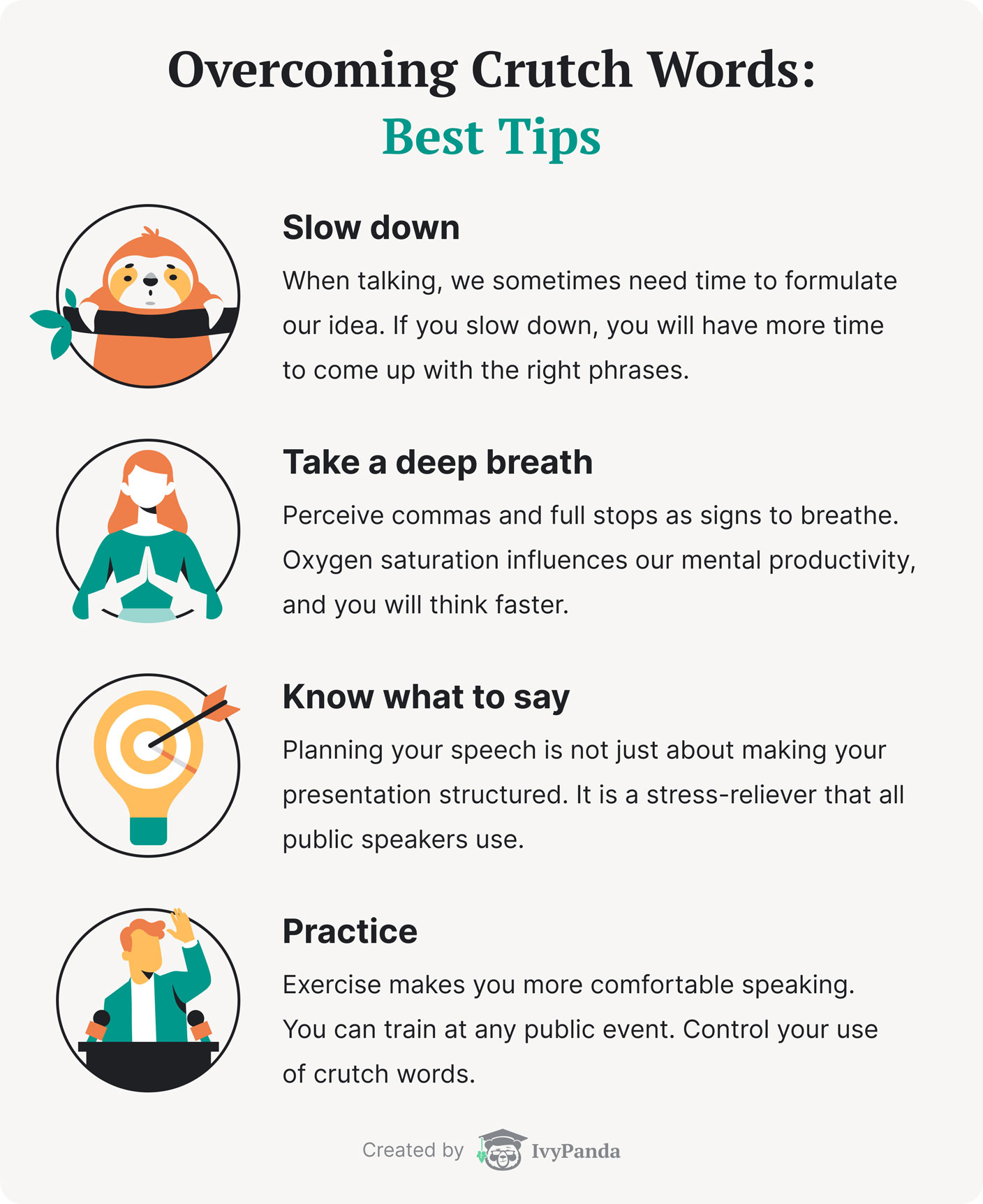
What is the speed of thought? It takes 50 to 150 milliseconds for our brain to react to simple stimuli. When talking, we sometimes need to formulate our ideas in our mind before saying them. This “let me think” time is often filled with crutch words. If you slow down, you will have more time to come up with the right phrases. Listen to popular public speakers. They pause after each sentence. By the way, such pauses help the audience to analyze what has been said.
- Take a deep breath.
This is another way to slow down. When we speak, we exhale. Our body needs oxygen, so we need to inhale once in a while. Perceive commas and full stops as signs to breathe. Oxygen saturation influences our mental productivity and will help you think faster. With some practice, you can incorporate this method naturally without anyone noticing.
- Know what to say.
Have you noticed that the more nervous you get, the more crutch words you use? When our ideas are disorganized, we are ignorant of where our trail of thought will lead us. This confusion makes us stress out. Try instead to prepare a plan for your speech. That way, if you forget something and start getting nervous, you can review your plan and move to the next point. This strategy isn’t only useful for making your presentation structured; it is also a potent stress-reliever, and all public speakers use it.
Everything gets easier with practice. Many people are afraid of silence and try to avoid it using crutch words, but practice will make you more comfortable speaking. You can train at any public event. For example, you can congratulate someone during a special occasion by saying something more elaborate than just “Wishing you love and health.” Think about what else you can say, and avoid your usual crutch words.
We tend to use crutch words instead of saying, “let me think.” They give us a feeling of security, like a favorite teacup or slippers. The more we get nervous, the more often we employ crutch words. So is it worth it to eliminate them completely?
Our answer is no . Impeccable speech without gap fillers is lifeless and lacks rhythm. However, using these words wisely adds emphasis to specific points and emotionally influences the listener. They make us sound “natural” and relaxed. Plus, it might just be too hard to get rid of them completely.
✍️ Are Fillers Interest Killers? Filler Words in Writing
Fillers are not as harmful as crutch words. We control our writing more effectively than our speech because we can stop to think as long as we need. Still, you should omit some phrases to make your writing more engaging.

Some academic sources insist on using linking phrases, such as “moreover,” “however,” or even “having considered everything mentioned above.” Modern blogging and academia are moving away from this tradition and prefer the concept of concise writing. Fillers distract the reader from the main idea, often wasting their time.
Concise Writing: Why Does It Matter?
Post-modern society has witnessed a tendency to simplify everything it can. We are lost in a sea of unnecessary information. Research has found that we use only 37% of the information taught at school. Of course, there’s also the continuous flow of advertisement and social media updates that inundate us.
That is why information overload is the problem of the 21st century. Some years from now, scientists will probably find a way to decrease its effect, but for now we have only one option – to communicate more concisely. The definition of concise writing is simple: use as few words as possible to convey your message. You can check out a wide variety of free college essay samples in our database to see how a well-written paper without any fillers looks like. Below you will find some advice on how to slim down your word count.
48 Fillers You Should Drop to Write Concisely
If you intend to make your writing concise, avoid these words. We have grouped them into four categories for your convenience. In most cases, these English fillers are superfluous. Sometimes, however, fillers create a necessary rhythm or make the text sound “natural,” so you’ll need to review them on a case-by-case basis.
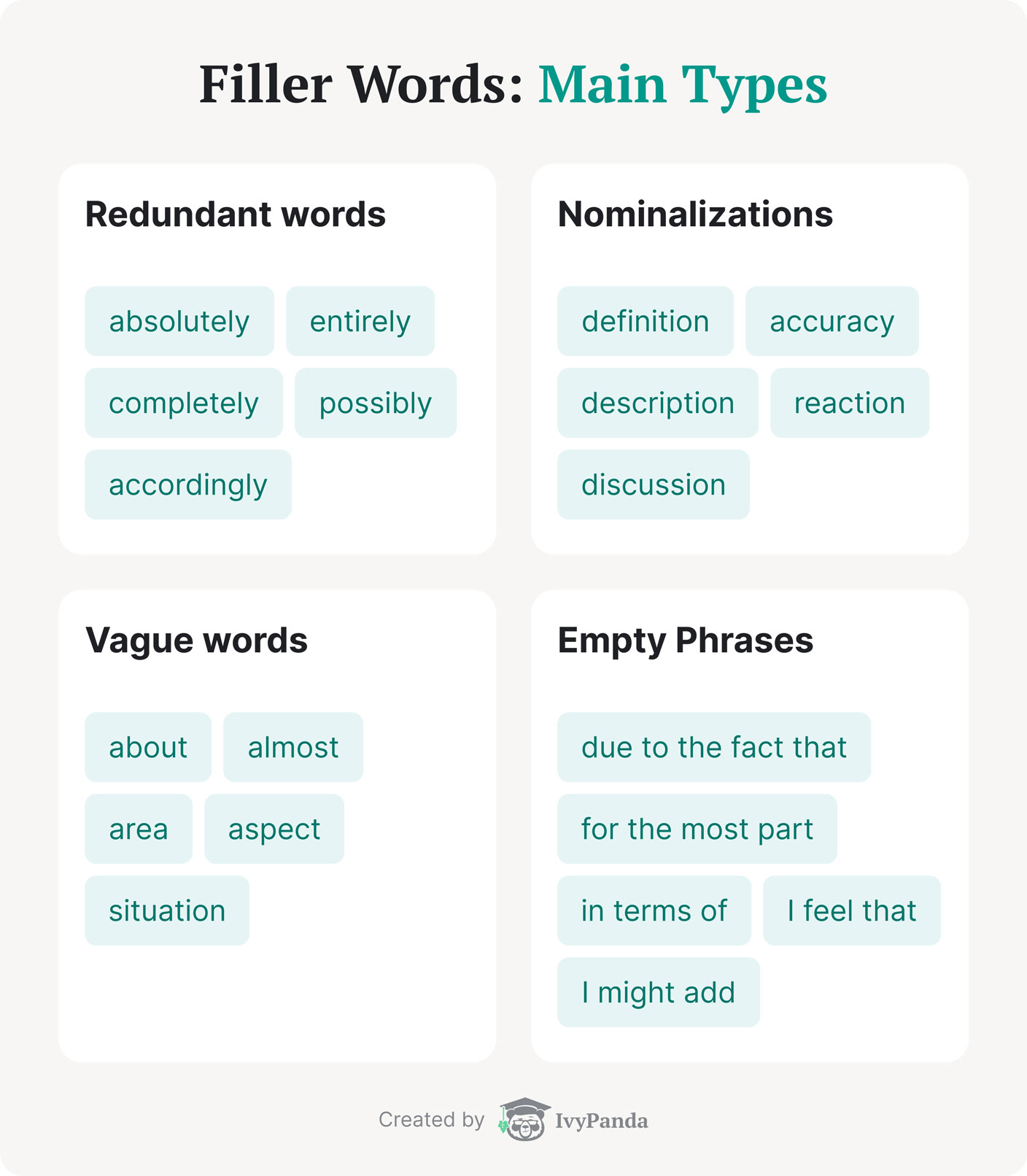
Redundant Words
Redundant words repeat the meaning of other words in the sentence. If it is possible to say the same thing in fewer words, always do so.
- Absolutely + necessary or essential:
Example: Love was absolutely essential to her happiness.
Revision : Love was essential for her happiness.
Example: The virus will be entirely eliminated.
Revision : The virus will be eliminated.
- Completely:
Example: He was completely sure the girl would say “yes.”
Revision : He was sure the girl would say “yes.”
Example: He could possibly become the next president.
Revision : He could become the next president.
- Brief + moment:
Example: For a brief moment, he remained speechless.
Revision : For a moment, he remained speechless.
- Ask + the question:
Example: I asked her a question about our plans.
Revision : I asked her about our plans.
- Actual + facts:
Example: The policeman submitted the actual facts about the case.
Revision : The policeman submitted the facts about the case.
- Accordingly:
Example: Accordingly, ask before making changes next time.
Revision : Ask before making changes next time.
- ATM machine: (The abbreviation “ATM” stands for “automated teller machine.”)
Example: The ATM machine is around the corner.
Revision : The ATM is around the corner.
Example: He entered in his childhood room.
Revision : He entered his childhood room.
- So or very:
Example: I was so glad to see him.
Revision : I was glad to see him.
- Still remains:
Example: The author still remains the most prominent figure of the 19th century.
Revision : The author remains the most prominent figure of the 19th century.
Nominalizations
Nominalization is when you use a noun instead of a verb or adjective. This practice usually slows the reader down. Since action words – like verbs – are more dynamic, you should try to avoid unnecessary nominalizations. Here are some examples:
- Definition:
Example: Her definition of self-care was getting enough sleep and eating well.
Revision : She defined self-care as getting enough sleep and eating well.
Example: The accuracy of our study was insufficient.
Revision : Our study was inaccurate.
- Description:
Example: Provide a description of the design you prefer.
Revision : Please describe the design you prefer.
- Had a discussion concerning:
Example: They had a discussion concerning the business perspectives.
Revision : They discussed the business perspectives.
- Had a conversation about:
Example: They had a conversation about their relationships.
Revision : They discussed their relationships.
- Have a need for:
Example: I have a need for a day off.
Revision : I need a day off.
- Increase in strength:
Example: Their love increased in strength.
Revision : Their love grew stronger.
- Is aware of:
Example: He was aware of her hatred.
Revision : He realized she hated him.
- Is in love with:
Example: They are in love with each other.
Revision : They love each other.
- Lack the ability to:
Example: I lack the ability to wake up early in the morning.
Revision : I cannot wake up early in the morning.
- Make a decision to:
Example: I couldn’t make a decision to end our communication.
Revision : I couldn’t decide to end our communication.
Example: His reaction offended me.
Revision : The way he reacted offended me.
Vague Words
Vague language is common in colloquial speech, but in writing, it looks unprofessional. Vague words lack solid definitions. Avoid the words below or replace them, following the instructions.
Example: About 100 visitors left reviews.
Revision : Approximately 100 visitors left reviews.
Example: It was almost time to leave.
Revision : They left a few minutes later.
Example: You need to get stronger.
Revision : You need to become stronger.
- Get out of:
Example: The building is on fire; get out of it.
Revision : You need to exit the building because it’s on fire.
- Individual:
Example: Any individual shall have a place of residence.
Revision : Any person shall have a place of residence.
Example: My initial thought was to leave.
Revision : At first, I thought to leave.
- You’re going to have to:
Example: You’re going to have to finish this at home.
Revision : You must finish this at home.
- Make available:
Example: Our service makes available multiple useful features.
Revision : Our service presents multiple useful features.
Example: We left the area.
Revision : We left the country.
Example: Planning is my least favorite aspect of traveling.
Revision : I like to travel, but I do not like to plan.
Example: The situation grew dangerous.
Revision : The uprising grew dangerous.
- Small, big, good, or bad:
Example: He was a good person.
Revision : He was a kind and caring person.
Empty Phrases
Empty phrases mean nothing in the literal sense. By the way, “in the literal sense” is also a meaningless phrase. These words distract the reader from your message and can sound colloquial. In many cases, you can do without them or replace them with a more meaningful construction.

All things being equal:
Example: All things being equal, we will earn twice as much next year.
Revision : If all goes well, we will earn twice as much next year.
- Due to the fact that:
Example: Due to the fact that he is a doctor, he minds his health.
Revision : Since he is a doctor, he minds his health.
- For all intents and purposes:
Example: For all intents and purposes, the protagonist will die in the end.
Revision : In the end, the protagonist will die.
- For the most part:
Example: For the most part, I like Chinese food.
Revision : I like Chinese food.
- For the purpose of:
Example: I go in for sport for the purpose of keeping in shape.
Revision : I go in for sport to keep in shape.
Example: Go ahead and kill that bug.
Revision : Kill that bug.
- Harder than it has to be:
Example: The woman made their relationship harder than it had to be.
Revision : The woman made their relationship harder than necessary.
- Here’s the thing:
Example: I’ll tell you the story. Here’s the thing.
Revision : I’ll tell you the story. Once upon a time…
- I feel/believe that:
Example: I believe that I am capable of doing it.
Revision : I am capable of doing it.
- I might add:
Example: He is handsome, I might add.
Revision : He is handsome.
- Integrate with each other:
Example: The devices must integrate with each other to function correctly.
Revision : The devices must integrate to function correctly.
- In terms of:
Example: His new position was perfect in terms of salary.
Revision : The salary was perfect in his new position.
Example #1: A Bad Cover Letter
In the follow-up to my job application, please kindly consider this cover letter.
First of all, I have been working as a teacher for multiple years. My initial experience started at the nursery school in the local area. However, I also tutored several classes in Junior School. Secondly, during the vacations, I arranged outdoor events for pupils who stayed at home and did not have a chance to travel. Thirdly, my passion to communicate with children is the definition of my work.
In terms of in-class atmosphere, I created a nurturing and friendly environment where all the children felt comfortable. In addition, I rigorously prepared the plans for each day, week, and term. Furthermore, I established strict rules of behavior in the classroom and outdoors and entirely ensured their observance.
I might add that I do my best for the purpose of comprehensive development of children and their successful integration into adult life. I possibly try to integrate contemporary teaching methods with each other to generate my own teaching style.
To conclude, I believe that my skills and knowledge are completely sufficient for the position of Junior School teacher. I feel that my experience will make a good contribution to the tutoring process.
Example #2: A Better Cover Letter
I have been working as a teacher for five years. My working experience started at Dallas Nursery School. I also tutored several classes in Junior School. During the vacations, I arranged outdoor events for pupils who stayed at home. My work is centered around my passion to communicate with children.
I created a nurturing and friendly environment where the children felt comfortable. I prepared specific plans for each day, week, and term. I established rules of behavior in the classroom and outdoors and ensured their strict observance.
I do my best to support the children’s comprehensive development and their successful integration into adult life. I try to incorporate contemporary teaching methods and generate my own personal teaching style.
My skills and knowledge make me a perfect fit for the position of Junior School teacher. My experience will tangibly contribute to the tutoring process.
In the above example, all the filler words were deleted to illustrate how informative and concise your writing can look without them. But you can still use them on occasion to sound natural and spontaneous. The principal criterion here is to write or say every word consciously. Excessive wordiness can hide the meaning you intend to convey. Besides, lengthy texts are read less attentively.
If you can say a phrase with fewer words, be sure to do so. Avoid filler and crutch words as much as possible. Please share your “favorite” words and phrases in the comments below. Which linguistic habit would you like to get rid of?
- Share via Facebook
- Share via Twitter
- Share via LinkedIn
- Share via email
You might also like

Living on-Campus vs. off-Campus: a Comprehensive Guide
![filler words to remove from essay 200 Interesting Historical Events to Write About [New Tips]](https://ivypanda.com/blog/wp-content/uploads/2020/05/medieval-knights-battle-field-309x208.jpg)
200 Interesting Historical Events to Write About [New Tips]

101 Teaching Guide: Methods, Strategies, Sources, and More!
- AI Title Generator
- Poem Title Generator
- Book Title Generator
- YouTube Title Generator
- Essay Title Generator
- Title Rewriter
- Title Capitalization
- Sentence & Paragraph Rewriter
- Essay Writer
- Book Title Wizard
- Character Name Generator
- Name Generators
- Pokemon Name Generator
- Character Backstory Generator
- Song Generator
- Poem Generator
- Word Search Puzzles
- Ideation Articles
- Random Topic Generator
- Writing Prompt Generator
- Random Essay Title Generator
- Writing Articles
- Online Word Counter
- Online Grammar Checker
- Headline Analyzer
- Best Book Writing Software and Book Writing Apps
- 150 Best Resources for Writers
- Productivity
- English Language
- Grammar Tips
- Headline Analyzer Tool
- Title Capitalization Rules
- For WordPress
- Publishing Articles
- Email Marketing
- Book Articles
- How to Get A Book Published
- Best Literary Agencies
- How To Self Publish a Book
Filler Words: What Are They and How to Avoid Them?
Filler words are discourse markers often used to fill speech or writing gaps. They might seem harmless, but they can make you sound uncertain, unprepared, or both. Luckily, there are tricks to reduce word stuffing.
In this article, we’ll take a closer look at the most common filler terms, why you should stop using them, and some no-fuss tricks for avoiding them in formal writing and speech.
Table of Contents
What Are Filler Words?
English filler words are also known as discourse markers . Native English speakers unintentionally use these words when they need help finding the right word or they’re still thinking about what to say next.
In public speaking, filler terms can be a problem because they can make you appear uncertain or unprepared. They can also distract the audience and make your message less effective.
Using filler terms, however, is not limited to public speaking or conversations. You can also spot them in written text like essays or articles.
In writing, you can use these words to emphasize a point or make a sentence sound more conversational. However, it can make your writing seem unclear and distract readers from the main issues you’re trying to convey.
What Are the Most Common Filler Phrases?
There are many filler phrases that people use in daily conversations and writing. However, these words add no value to your statement and only help bridge the gap between your thoughts. Below are the most common filler words that people use often.
These are among the most popular verbal fillers you often use when you are hesitant or uncertain about something.
When you use “um” or “uh,” it indicates that you are pausing to think of something or unsure what to say. “Um” shows that you are searching for the right word to use, while “uh” indicates that you’re having trouble expressing an idea or concept.
“Ah” is also a common filler word when you have just had an idea or have realized something. It expresses surprise or realization and relays a sense of pleasure or satisfaction in something.
This is a filler word that is similar to “um,” “uh,” and “ah.” However, it indicates a more negative concern regarding something. People use “er” in a sentence to show doubt or a potentially even alarm concerning an action, statement, or thought. You can also use this word when unsure of the best course of action or decision to make.
Very, Really, Highly
The words “very,” “really,” and “highly” are also words that fill gaps or pauses in a conversation. You can use it to emphasize a statement or express your emotions or feelings about something.
The word “very” indicates a high degree of intensity, while “really” emphasizes a statement or expresses surprise or disbelief. On the other hand, the word “highly” indicates that something is of very high quality or worth.
“Hmm” is another filler word used when thinking or considering something. It can pause a conversation or show that you are considering a question or comment.
Overall, “Hmm” is a way to express uncertainty or hesitation in a conversation. Sometimes, people use it as a polite way to disagree with something or express skepticism. This word can also indicate that you are unsure of how to respond.
The word “like” is a commonly used stuffing phrase in speech and writing. It often shows that you are thinking or considering what to say. Using this word helps make a statement more tentative or less direct.
Unlike others, “just” is not always a filler word. People use it to indicate an action that occurred recently and as a synonym for merely. However, it qualifies as a filler word, particularly when overused in a sentence. In most cases, using too much of this word can also change the meaning of a sentence.
The phrase “you know” is commonly used to fill pauses or gaps in conversation, making it a filler word. Many speakers use it when trying to think of the right word or when unsure how to proceed.
“Right” is often used as a filler word in spoken language. It indicates that you are thinking during a conversation or to signal that you are about to say something. This way, “right” keeps the conversation moving forward without adding specific meaning or content.
Totally, Literally, Seriously
These are among the most common filler phrases used in everyday speech. “Totally” indicates agreement or support for something, while “literally” emphasizes the truth or severity of a statement.
On the other hand, “seriously” demonstrates that something is not a joke. It also expresses disbelief. While each of these words has a practical meaning, they can be fluff if misused.
“Okay” is a word that can have a literal meaning when used to indicate agreement or acceptance of something. However, it becomes a filler word when you need help with what to say or when thinking of something. It’s also commonly used when you have completed a conversation and have nothing to add.
Why Do People Use Filler Words?
In most cases, you may use filler expressions to help you think or organize your thoughts while speaking.
You could also use fillers to reduce anxiety or nervousness while speaking. They help to break the silence and make you feel more comfortable.
Filler phrases also serve as a buffer , allowing you to take a moment to collect ideas without immediately jumping back into the conversation.
Using these words can signal that you are still engaged in the conversation and actively listening to the speaker.
Why Are Filler Words Bad?
The use of filler words hurts your speech and writing for multiple reasons. Firstly, they make you unsure or unconfident in what you say. They can also make your speech seem disorganized and unclear.
These words can also distract your listeners and prevent them from understanding your message. Using too many of them can indicate that you are nervous or unprepared. Sometimes, it makes you look like you are lying. These terms also take up space and time in your speech, making it challenging to convey your message effectively.
How to Avoid Filler Words in Writing?
Filler phrases impact your writing and can make you look unprofessional. However, you can avoid them using the following tips;
- Plan and outline your writing before you begin. This will help you organize your ideas and prevent using these words while thinking about what to say next.
- Be concise and direct in your writing. Avoid using words or phrases that add little to no value to your sentences.
- Take the time to revise and edit. As you read through your work, pay attention to any filler phrases you may have and remove them.
How to Avoid Filler Words in Speech?
When filler words appear in speech, they also make you look unprepared. Read our how to write a speech guide and apply the following tips:
- Practice speaking out loud with a friend or family member to become more aware of how you use stuffing words.
- Pause before speaking to give yourself time to organize your thoughts.
- Use alternative phrases to fill pauses, such as “let me think” or “let me see,” instead of using filler words.
- Focus on delivering your message clearly and concisely, and avoid using filler phrases to fill gaps in your speech.
- Eliminate unnecessary phrases to create a compelling and engaging speech.
Filler terms are common in both speech and writing. While they seem to have no harm, they can make you seem unprepared or unconfident in whatever you say. Use the above tips to break this bad habit and make conversations more efficient.
RELATED ARTICLES MORE FROM AUTHOR

What Is Alliteration?

Etc Meaning: What Does It Mean?
![ProWritingAid Review – 2024 Update [With 20% Discount Code] Prowritingaid Review](https://capitalizemytitle.com/wp-content/uploads/2020/08/prowritingaid-review-218x150.png)
ProWritingAid Review – 2024 Update [With 20% Discount Code]

11 Best Plagiarism Tools 2024

Literary Devices: What Are They and 38 Common Types (With Examples)
![Grammarly vs. ProWritingAid Review: Which One Is Better? [2024 Review + 20% Discount] grammarly vs prowritingaid](https://capitalizemytitle.com/wp-content/uploads/2020/03/grammarly-vs-prowritingaid-218x150.png)
Grammarly vs. ProWritingAid Review: Which One Is Better? [2024 Review + 20% Discount]
Leave a reply cancel reply.
Save my name, email, and website in this browser for the next time I comment.
- Accessibility
Forgot your password?
Lost your password? Please enter your email address. You will receive mail with link to set new password.
Back to login
- Translators
- Graphic Designers
- Editing Services
- Academic Editing Services
- Admissions Editing Services
- Admissions Essay Editing Services
- AI Content Editing Services
- APA Style Editing Services
- Application Essay Editing Services
- Book Editing Services
- Business Editing Services
- Capstone Paper Editing Services
- Children's Book Editing Services
- College Application Editing Services
- College Essay Editing Services
- Copy Editing Services
- Developmental Editing Services
- Dissertation Editing Services
- eBook Editing Services
- English Editing Services
- Horror Story Editing Services
- Legal Editing Services
- Line Editing Services
- Manuscript Editing Services
- MLA Style Editing Services
- Novel Editing Services
- Paper Editing Services
- Personal Statement Editing Services
- Research Paper Editing Services
- Résumé Editing Services
- Scientific Editing Services
- Short Story Editing Services
- Statement of Purpose Editing Services
- Substantive Editing Services
- Thesis Editing Services
Proofreading
- Proofreading Services
- Admissions Essay Proofreading Services
- Children's Book Proofreading Services
- Legal Proofreading Services
- Novel Proofreading Services
- Personal Statement Proofreading Services
- Research Proposal Proofreading Services
- Statement of Purpose Proofreading Services
Translation
- Translation Services
Graphic Design
- Graphic Design Services
- Dungeons & Dragons Design Services
- Sticker Design Services
- Writing Services
Please enter the email address you used for your account. Your sign in information will be sent to your email address after it has been verified.
Remove These 30 Words and Phrases from Your Writing Now

Becoming a better writer is an art form. It requires patience, research, reading voraciously, and above all—practice. In the process, a writer's lexicon should be consistently curated, since words are the basis of the writing profession, and words that are vague or superfluous should be replaced with better ones or deleted.
If you want to sharpen your craft, here are 30 words and phrases to remove from your writing now.
Down, up (if following sat or stood)
In most cases when you see these two words following "sat" or "stood", it's superfluous. "She sat down in the chair" could be "she sat in the chair," and "they stood up to sing" could be "they stood to sing." The point here is to keep your writing as sharp as possible.
In many cases, use of "that" is either superfluous or incorrect. "The book that is on my bookshelf" could be "the book on my bookshelf" and retain the same meaning. "The night that we're going to the baseball game" should rather be "the night we're going to the baseball game."
"That" is also incorrectly used when referring to people. For example, "I have a friend that plays cello" is incorrect. You don't have a friend that plays cello. You have a friend who plays cello. In the same sense, "My aunt that is visiting from Florida" should be "my aunt who is visiting from Florida."
Said, asked, replied, whispered, demanded or any other dialogue tags (after the first few sentences of dialogue)
Instead of using dialogue tags, which slow the pacing of the story, reserve them for the first few sentences of dialogue then ditch them afterwards. After your reader understands the order that the characters are speaking in, they'll catch who's saying what without these distractions.
You can also use actions taking place between and around dialogue to help note who is saying each line. Consider the two examples below. Which one has the better pacing?
"What time is the meeting tonight," asked Steve. "I have no clue," said Terrance, "but they sent out an email this morning." "Yeah, my email inbox is swamped with complaints," said Steve. "Complaints?" said Terrance. "Don't ask," said Steve.
Steve stopped, knowing now why he felt like he was forgetting something all morning. "What time is the meeting tonight?" "I have no clue, but they sent out an email this morning." Terrance didn't bother to look up from his work. "Yeah, my email inbox is swamped with complaints." "Complaints?" At least now Terrance was interested. "Don't ask."
Think, thought, felt, feel, realize, wonder
Using these words in your story is a great example of telling vs. showing. You don't have to tell your reader that the main character is thinking something. Simply put it in italics to show that it's a mental process within the narration.
Or alternatively, state it. If your protagonist wonders whether the love of his life is gone for good, don't write "he wondered if the love of his life is gone for good." Instead, write the question: "Was the love of his life gone for good?" The fact he is wondering this is implied in the narration, so the reader sees what the character is wondering about without being told that the character is, in fact, wondering.

This is one of those lazy words that should be replaced with something more descriptive and compelling. Instead of writing, "She went to church" you could rather write "she drove to church." Instead of writing, "He went to soccer practice" you could rather write "he ran to soccer practice." See how that changes the image? Not only did you avoid a vague word, but you used the same word count to offer more detail for your reader.
This word might be more often used in nonfiction or blog articles, but if you're a writer, you should immediately strike it from your vocabulary unless you're using it to describe how someone else has spoken or done something.
While it's mostly used to add emphasis, when it's used for this purpose, it immediately implies that the other words you've written are not honest. "Honestly, I'd rather watch a Netflix show than go to the movies" is exactly like saying "I'd rather watch a Netflix show than go to the movies," except there is implication that you're only now being honest. Additionally, as mentioned for "that," extra words should always be removed for sharper writing unless you are going for a purposefully chatty, informal vernacular.
Absolutely, totally
While usually intended to add emphasis, these words are the epitome of redundancy and are almost never needed. If something is important, it's important. Making it absolutely important or totally important doesn't change anything. In the same sense, if something is essential, making it absolutely essential doesn't make it any more essential than it was before adding "absolutely" to it.
Very, really, rather, quite
These words are modifiers but should always be replaced with a better word to sharpen up your writing. For starters, they signal a young and/or inexperienced writer. If you're using them in dialogue between young people, that's another story, but if it's coming from you—the narrator—find a better, more engaging replacement.
For example, you could describe a "really beautiful day" or say it is a "dazzling day." You could mention that a road trip will be "very long" or you could rather describe it as "immense," "far-reaching" or "lengthy." Regardless of what you're describing, you will always be able to find a more suitable replacement for "very" and "really." If you choose the right adjective, it shouldn't need to be qualified. If you're stuck, simply pull up an online thesaurus and get unstuck quickly.
Writer and humorist Mark Twain had a useful solution to removing unneeded modifiers from your writing. "Substitute 'damn' every time you're inclined to write 'very'. Your editor will delete it and the writing will be just as it should be.
Florence King , American novelist, essayist and columnist, put it like this: 'Very' is the most useless word in the English language and can always come out. More than useless, it is treacherous because it invariably weakens what it is intended to strengthen.
At one time, "amazing" was just fine to use. It means " causing astonishment, great wonder, or surprise " and is used constantly in everything from slogans to speeches to social media posts to conversations about sports or the weather. Simply put: it's overused. Here's a list of less-overused words that express the same (or nearly the same) concept.
- Fascinating
- Unbelievable
- Mind-blowing
Always, never
These words create absolutes and can make your writing seem inaccurate or even closed-minded. To say that something always happens is to claim that you have an omniscient view of an incident, across locations, situations, and even time periods. Obviously, this is not the case.
Women don't always nag their husbands and dogs don't always torment cats. It doesn't always rain in Seattle and children don't always say mean things to each other. In the same sense, claiming that it never rains in the desert or love never lasts makes the writer seem unprofessional, overly confident, and simply wrong. That's why using these words in your writing should be avoided.
If this word is used correctly, it denotes something that happens exactly as stated, in the literal sense. However, you'll often see it doing the opposite, or used with a figurative expression (as in, "That literally scared me to death!"). If you "literally" thought you were dying, be sure that was the case before using the term. Or even better—don't use it at all and simply note how you thought you were dying. Rarely does the use of the term add important information and as mentioned regarding several of the words on this list, extraneous or vague words are best left unwritten.
This is another filler word that adds nothing to the meaning of the sentence, unless it is used to describe an action that is based on, or person behaving according to what is morally right and fair (the literal definition of the word). Think of it as sugar. It's best to leave it alone entirely, but if you must use it, moderation is best. It's nothing but empty calories.

Stuff, things
We've all met that person who overuses "thing" when they can't remember the word for the object to which they're referring. "Stuff" falls into the same category and neither should be used by writers who would be expected to have an above-average vocabulary. Be specific!
Irregardless
This is one of those words the majority will get wrong, since many who use it don't realize that its meaning is "regardless ." Although it is a word, it is nonstandard in that its prefix (ir-) and suffix (-less) create a double negative. Since its meaning is often misunderstood, combined with a double negative that's confusing, it's best to avoid using it at all.
Related Posts

Overcoming Impostor Syndrome in Your Writing

How to Defeat Writer's Block, Once and for All
- Writing Advice
- All Blog Posts
- Academic Writing Advice
- Admissions Writing Advice
- Book Writing Advice
- Short Story Advice
- Employment Writing Advice
- Business Writing Advice
- Web Content Advice
- Article Writing Advice
- Magazine Writing Advice
- Grammar Advice
- Dialect Advice
- Editing Advice
- Freelance Advice
- Legal Writing Advice
- Poetry Advice
- Graphic Design Advice
- Logo Design Advice
- Translation Advice
- Blog Reviews
- Short Story Award Winners
- Scholarship Winners

Looking for help with your writing?

40 Crutch Words to Eliminate from Your Prose
- August 22, 2017
- Self-Editing
- 18 Comments
- by Hannah Bauman

Hello, writers!
Have you ever been self editing and wondered what you can do to make your prose stronger? Or, have you ever received a draft back from an editor–a draft you’ve already gone over multiple times yourself–and noticed lots of deletions?
You’re not alone. We all use crutch words when we speak, and those words ten to transfer to our writing.
Crutch Words
What are crutch words?
In speech, they’re filler words that give us more time to think about our response. In writing, they’re words and phrases we’ve picked up or used for a particular reason, but we end up overusing them.
A good example is the word “definitely.” This is one of my crutch words. I’m sure I started using it in emails or other writing to sound positive. Something like, “I can definitely edit that manuscript for you” became the norm. Luckily, I caught onto my email crutch word quickly and now check my emails for it before hitting send.
Identifying Crutch & Filler Words
So, you know what crutch and filler words are, but how do you identify them in your own writing?
Grab an older piece of writing–an old blog post, early chapters of your manuscript, or something else you haven’t touched in a while.
Next, start scanning the text. Every time you see the same word or phrase, highlight or underline it.
Do the same thing but on a more recent piece of writing. If you find similar words or phrases being overused, you’ve found your crutch word!
Words to Eliminate from Your Prose
Crutch words will be different for everyone, but I have compiled a list of words and phrases I see being overused by multiple authors and bloggers, myself included!
But, I’d like to make a few notes before you dive in.
Note #1: Not all of these words are bad, and not every instance needs to be eliminated from your prose. Shocked? Think about it! If your character is speaking, they’ll probably use words like “a bit” or “just.” Dialogue doesn’t need to be perfectly clean because when we speak, we are all over the place. But for your narration, it’s good to keep your diction strong.
Note #2: When you search for these words in your manuscript, note how many times you’ve used the phrase. Did you use “as though” one time? If so, what was the context? Examine each usage carefully, and make a decision about whether it will affect the tone and style of your writing. Use your best judgment.
Note #3: Writing is not an exact science, and neither is editing. Rules are not hard and fast, and there is a lot of gray area. If you love one of the words on this list, don’t feel like you absolutely must remove all traces of it from your work. These words only become a problem when you’re relying on them all the time. Except for “shrugged his/her/their shoulders,” because that’s just redundant!
And now, without further ado, here is an extensive list of words to remove from your prose. Happy writing!
- Seem/Seems/Seemed to
- Appear/Appeared to
- Beginning to
- Shrugged his/her/their shoulders

18 Comments on 40 Crutch Words to Eliminate from Your Prose
- Pingback: What Is Self-Editing – Writing without Drama
I can understand words like basically, generally, naturally but it’s news about other crutch words. Nice insight Thanks
At the top of that list needs to be the emphatic use of ‘literally’. It causes me an irrational level of annoyance that borders on anger every time I hear it.
Thanks for your comment. Merriam-Webster and other dictionaries include a definition for exactly that informal use of the word. “used in an exaggerated way to emphasize a statement or description that is not literally true or possible.” You can see it here, including their FAQ on including this extended definition: https://www.merriam-webster.com/dictionary/literally
My point is that while some words are crutch words, and while there are almost always ways to strengthen our diction, language and how we use it is always evolving. 🙂
Could “and” be a crutch word? I’m asking because people also tend to use when they begin a sentence.
Great question. 🙂 I wouldn’t consider “and” a crutch word since it’s a common conjunction. Of course, if you’re ALWAYS using ‘and’ without varying sentence structure or diction, it might feel repetitive.
Regarding starting a sentence with “and,” you can absolutely do that! Many of us were told not to use “and” or “but” to start a sentence back in school, but it’s not actually a rule of grammar. In informal writing, those words work better than their formal counterparts “additionally” or”however.”
Good observation. Most people have ‘and’,’like’, ‘you know’syndrome in their speaking. This is also very annoying.
Hi Hannah, thank you for this post. Do you have examples? I am not a professional writer but my profession requires me to write. I almost wrote “Do you have SOME examples?” The inclusion of “some” in that sentence would be a crutch word?
Thanks Lauren
Hi Lauren, glad you liked the post! I don’t think ‘some’ would necessarily be a crutch word there, although it’s not really necessary to include it. What kinds of further examples are you looking for?
What about the word “that” as I find it’s a filler word used way too much and unnecessarily. ex. “I find that the word ‘that’ is used too frequently”. Instead, I would type, “I find the word “that” is used too frequently” and eliminate the first “that”.
Great question! Yes, ‘that’ can be a filler word, though it is sometimes needed. When you’re self-editing, just be sure your sentence makes sense without ‘that’ before deleting it. 🙂
“It” can be a serious crutch word when something proper could be put in “it”s place. “He picked it up.” Vs “he lifted his mug.”
Yes! I’m also surprised “thing” and its cousins aren’t on this list.
Here’s a little more information on what words and when to remove from your writing: https://www.lorenweisman.com/2020/04/11/words-to-remove/ I think this is a good addition. For me, that’s the hardest part. Where people make do with 20 words, I write over 200. And I can’t help myself. But I try to watch my writing and not use clichés. Often I search for the most popular words – Word highlights these words in the text, and I try to find the words I can leave in the text or remove them. Such revision helps a lot.
A lot of people say ‘like’ all the time now and it can be annoying.
Another word over used is ‘absolutely’ especially my Doctor!
I didn’t know they had a proper name. I just called them ‘confetti’ words.
Oooo! I like that term: “confetti” words! Good one!
Is the phrase ‘I would say’ considered a popular crutch word/phrase when repeated at least three times in an article or transcript? For example: “We had a lot of, I would say, batteries that went bad over that period of time.”
It could be! It depends on the context, but in your example, it looks like a phrase that could be cut and readers would still understand the sentence.
Leave a Reply Cancel reply
Your email address will not be published. Required fields are marked *
Notify me of follow-up comments by email.
Notify me of new posts by email.
This site uses Akismet to reduce spam. Learn how your comment data is processed .

Grab your freebies!
Start working on your next project with the help of our library of free worksheets and printables..
You'll also receive a bi-weekly newsletter from me, the occasional business update, new freebies, and special editing deals!
Writers in the Storm
A blog about writing.

Fix Fluff Words – 14 Fillers for Writers to Avoid
By Kris Maze

Cutting out filler in your novel isn’t easy. Taking the time to tighten up your writing can make readers buy your books and turn an editor’s tired eye. How can writers take a thorough approach to editing out extraneous words?
“Search and Destroy” is what one editor told me while cleaning up my manuscript. It’s tough to hear, but there are words that writers simply need to kill. In the spirit of clarity, of course. Perhaps this post with a detailed list can help you work through your writing and save you time.
Why is it important to cut these words?
Fluffy phrases cause our readers to think of naps and soft pillows and putting down our wonderful books. No writer wants that to happen, so we work with care to unearth the words that cause the reader to pause. Keep your reader from thinking about nachos or kittens or their shopping list. Whatever is on their mind, dear writer, it is no longer your story. And that is a terrible waste of time and mind-space.
It’s true that fiction writers are destined to break the rules of convention to make a creative point. But many writers overuse these no-go phrases. We can use these extra words sparingly, but only with the finesse that can wow the reader. Using filler words must justify the potential fluff factor with an unexpected twist or clever turn, or they shouldn’t be used at all.
We want our readers to keep turning pages and to do this we need to remove blockages they may encounter. Too many words, when a simple description will suffice, makes readers skim. Skimming is as bad as setting the book at the bedside. Let’s get our books ready to read by removing the excess, and in the process, have more writer success.
Use this list to help in your editing process. Keep your readers engaged and consider editing out these phrases to enhance your story. It’s daunting, but one can look for these word-culprits and delete, delete, delete.
Lose the Fluff!

Vague Words, Let Us Be Clear
One way to tighten your writing is to use more specific vocabulary and avoid vague phrases that include the word ‘some’. Someone, something, sometime may be tempting to use, but they often muddle the real details your reader needs to know. There are many variants of the SOME family, get rid of them all.
Other phrases in this category include: one of , thing , and stuff . Your word-crutch words may include other phrases too. Notice what these are while editing and add to your own key-words-to-kill list. Being aware of your common filler words will help you avoid them in the future.
Do a find search in your document to see how many of these vague words are lurking in your story. Add specific details and actions where these words show up. This can provide clarity for your reader and draw them further into your action.
Words to Search:
To be or not to be cut.
Be verbs and gerunds are indicators of loose fluff on your pages and should be considered when editing. A be verb followed by a gerund (a grammar term for a verb used as a noun that ends in - ing ) is a common construction that slows the action for a reader. Try these sentences in this basic example:
Words to search:
Internalization.
Internal thoughts, feelings, and states of mind are another source of fluff to cut. Writers get a tighter story when they use other techniques to express what is on the character’s mind. If it makes sense, a writer could also simply add the thoughts to dialogue.
One way to fix these internal musings is with italics. Use italics to show what they think, feel, or realize is a mental process within the narration. See the example we used above:
Another way to fix internalizations is to show the action that causes this idea or feeling in the POV character. Show the reader what is happening to pull them deeper into the story.
If they are reading about what the characters are feeling there is a disconnect between the reader and the story. If they are immersed in what happens at that moment , they will feel these connections and discover key story elements for themselves. And that makes reading a pleasurable page turning experience.
See this now modified example from the simplified version above:
Details can add a vivid picture of what happens in the story. It draws the reader in and leaves them with questions about what happens next. Who is the journalist? Why is someone looking into the window? Are they a hired detective? What do they want to find? Are they CIA? Who is the woman? Why does she have the numbers to a secret safe? What motivation does she have? Writing details like these will compel a reader to continue to the next page and chapter. It adds much more than the filler words ‘he realized there was criminal activity a foot.’
Very and Other Distracting Modifiers
Using Very has been discussed in writing groups often. Eliminating this word has been quoted by Mark Twain when he famously asked writers to replace the word ‘very’ with ‘damn’ and it will be deleted by their editor. I also appreciate the argument made by a fictional teacher…
“So avoid using the word ‘very’ because it’s lazy. A man is not very tired, he is exhausted. Don’t use very sad, use morose. Language was invented for one reason, boys—to woo women—and, in that endeavor, laziness will not do. It also won’t do in your essays.” —N.H. Kleinbaum, Dead Poets Society
Other phrases like rather , quite , and really accomplish very little in a story also. Try a search on these wor
With fine tuning the places where you see the word are places to look for the more apt word. When choosing a replacement for very phrases there are a few ways it can improve your story.
- Does the new word heighten the genre or theme of your story?
- If the word is spoken or a thought, does the word choice exemplify the unique aspects of that story character?
- Can the words you choose add a literary element to your writing? Rhyming or great cadence also draw readers into your work.
- Very and the following words that are being described
Adverbs and Other Sins
Personally, I am a fan of using adverbs like a little dash of salt in my stories, but it is well-known in writing circles that one must avoid using adverbs. Adverbs, or the words that describe how an action occurs, are often an easier way to show the reader what exactly is happening in your story.
Look for how you described actions throughout your manuscript. Do you have places to strengthen your writing with clear crisp descriptions? Try adding setting elements, characterizations, and specific actions to better describe what is happening.
- Words describing how an action occurs
- Look for words that end in - ly
Never Use Always
Absolutes are on the list because they don’t say what is happening in the story. Never means someone has zero possibility of occurring. Is that true?
If there is a case where it could be true, is it worth writing it in or eliminating the word for clarity? Dogs don’t always chase cats. Teenagers are not always moody. It doesn’t always rain in the Pacific Northwest. It’s also not true that allegedly George Washington never told a lie.
Never and always usually add distraction to your story. Unless it is a specific, definitive point, consider eliminating these extra words. Try using juxtaposing ideas instead, like in this simplified example:
Try an example using always.
- Other words showing absolutes
Tips for Reviewing your Manuscript for Phrases to remove
- Read your work aloud or use the read feature found in many writing software programs.
- Critique another writer’s work and use a similar list to cut. Using fresh eyes of another writer (and doing the same for them) can help reveal phrases you may overuse.
- Try the Find command in Word or other writing program.
However you accomplish your editing tasks, try cleaning up your writing by pulling these phrases from your work. Watch for my next post when we go over more words to cut from the comprehensive list.
Do you have tips for editing filler words from your writing? Do you have a phrase or word that you overuse? Share in the comments below.
* * * * * *

Kris Maze is an author, writing coach, and teacher. She has worked in education for many years and writes for various publications including Practical Advice for Teachers of Heritage Learners of Spanish and the award-winning blog Writers in the Storm where she is also a host. You can find her horror stories and keep up with her author events at her website .
A recovering grammarian and hopeless wanderer, Kris enjoys reading, playing violin and piano, and spending time outdoors.
And occasionally, she knits.
23 comments on “Fix Fluff Words – 14 Fillers for Writers to Avoid”
Thanks for these helpful words! One nitpicky question: Did Sherlock say 'the game is afoot,' or 'the game is a foot'?
Sherlock could have said "aninch." Or perhaps "ayard." But assuredly he chose to say "afoot."
Ai-yah! Love it.
Thank you, Anna! I'd have to dig in more to find an answer, but you provided one instead. Are you a mystery writer?
Great comment, Dave. I'll have to look into it for an apt response!
Glad you like the list and hope you catch part 2 coming soon.
The two biggest culprits of dull writing are missing here:
That and Had.
That can mostly be deleted without issue or the sentence rewritten. Had is the same.
He had gone to the grocery store. He went to the grocery store. She knew that he was the victim. She knew he was the victim.
Some books, even by bestselling authors, use had in almost every sentence. It's utterly distracting.
Right on, Albert! My natural inclination for "that" during drafting makes me insane during the editing phase.
"That" is often extraneous. However, "had gone" is not the same as "went". The first was already past in the past; the second is simple past tense.
This is worth printing and posting next to my computer!
Thank you, Sam. There is more to come. I often found myself adding words to my own editing list over time. Part 2 will cover how to tailor your list to your needs and more.
Do it, Sam!
I would agree, except in dialogue. If we want our dialogue to sound as "natural" as possible (without bending to the ridiculous extremes) aren't some of these words going to appear and be almost required? The dialect I'm most familiar with is the "present progressive" which shows immediate action. "She started preparing dinner" says she is in the process of it when the ensuing action happens. But "she prepared dinner" makes it completed action. "He began walking" is different than "he walked." I suppose it depends on what you're trying to accomplish in the action?
Great post; Thanks. I will post the link on my blog.
That's wonderful, Rosi! I appreciate the share.
Wonderful post and very informative! Thank you!
just and that
Yay, it posted. My WP was messed up, and I when I was catching up from being away, I couldn't post on any of the posts I missed.
So and very are my biggest problems. You'd think they would be easy to cut out, but they seem to multiply on the page when I'm writing!
And the cutting continues. The verb "to be" is so easy to use and I need to attempt to root that out. Your cut list is helpful! I tend to overuse certain bodily movements. Far too many eye and eyebrow actions. Critique partners really help. Great post, Kris!
Great post, Kris. My first drafts are fluffier than a bag of marshmallows.
Some, but not all, of this advice is valid. The expanded versions were certainly more interesting than the original examples. It frustrates me that so many people insist a form of the verb "to be" with a present participle of another verb must be replaced. This is the present progressive form of a verb. It has a meaning and a purpose. "He looked" and "he was looking" express different things. Sometimes one is preferable and sometimes the other. Oh no! I used "sometimes". And "some". Again, they have a use. By the way, criminal activity is never (!) a foot, unless it's a foot on someone's backside, propelling them off a bridge. It could be afoot, however. Rigid implementation of any "rule" is a sure way to make your writing stodgy, IMHO. Too terse is as bad as too verbose and may not communicate what you're trying to communicate.
[…] a previous Writers in the Storm blog post, we covered several common filler words to avoid. This post extends the list of word-culprits, […]
[…] Character Flaws – How to Start a Novel – Synonyms for Very – Fix Fluff #1 – Fix Fluff #2 – Story Stall – Building Blocks of Scene – […]
Subscribe to WITS
Type your email…

Recent Posts
- Ways to Know Your Characters, Part 4- Strengths
- The Truth About Website Growth
- 5 Things Working With Kids Taught Me About Writing
- The Name Game: Tips for Naming Your Characters
- AutoCrit Author Tool Inventory – What’s New in 2024
- Ellen Buikema
- Jenny Hansen
- Lynette M. Burrows
- Lisa Norman
Copyright © 2024 Writers In The Storm - All Rights Reserved
- AI Content Shield
- AI KW Research
- AI Assistant
- SEO Optimizer
- AI KW Clustering
- Customer reviews
- The NLO Revolution
- Press Center
- Help Center
- Content Resources
- Facebook Group
Filler Words for Essays: How to Avoid Them
Table of Contents
Drop Filler Words for Essays: How to Write Better
Your writing is too long. How do we know? You drop filler words for essays and didn’t cut words from your writing.
When you write, you want to drop filler words for your essays because they’re like little rocks in the river of language. They rob you of fluidity.
You might have seen how people can write 1,001 words and still not say it all — it’s called wordiness.
A wordy writer is not a lazy writer. The problem is that too many writers use filler words to make their writing more readable.
Let’s talk about what filler words are and why you should drop filler words for essays.

Understanding Filler Words and Their Impact
Writers use filler words at the end of a sentence to add emphasis, express emotion, or slow down the sentence.
They often make a sentence sound more formal and polite. For example, it’s a little more formal to say “You should’ve let me know that” than “You should’ve called me.”
Since grammar rules are complicated and subject to many exceptions, the best way to learn them is to practice and play. Try to cut as many filler words as possible.
For example, the sentence “I’m going to the store, please wait for me” can be written as “I’m going to the store, please wait.” Cut out all unnecessary words so as to enjoy fluent writing.
The best way to drop filler words for essays is to use different words and sentences with few repeated words . Use as many adjectives and adjectives as needed in your writing! It’s all up to you.
Remember, writing is supposed to be a creative expression rather than a copy purely meant to convey facts and data.
Steps to Avoid Filler Words in Your Writing
- Write your essay by breaking it down into smaller pieces to get it done. Common filler words that people habitually use even in speech are “well,” “you know,” “so,” “like,” and “for example.”
- Don’t begin sentences with words like “since” or “as.”
- Use paradoxes that are opposing ideas. “The cost of our lives is greater than the cost…
- Don’t go for simple words like “it’s” and.”
- Avoid saying “It was like…” instead, say “It was like that.”
- Notice where you might be unwittingly repeating yourself
- Choose your words carefully because they stick
If there are problems with your writing, perhaps it will irritate or aggravate your reader. The relevance of the word “too long,” no matter where it lies, varies considerably depending on your medium and the reader’s stamina.
There are various ways to make writing meaningful and lean. One sure way is to find sentences to delete without loss of meaning.
This method entails finding flabby sentences or words cutting through the entire manuscript rather than individual words or sections.
Overwriting usually means you focus on yourself instead of the reader, which ultimately means your message will be lost.
Sometimes, a writer could continuously use the same word or phrase, albeit unconsciously. Learn to say what you need to say once. Continuous repetition of words irritates, bores, or puts readers to sleep.
Strategies to Improve Your Essay
- It is best to remove the majority of “that.” Writers should use “that” to indicate a grammatical need or deliberate emphasis.
- Start and end sentences with strong words. Restructure sentences to begin and end with nouns or verbs rather than prepositions or filler words when possible. “Jane was kind of petty” rather than “Besides all that, she was petty, kind of.”
- Put strong words in anchor positions and pay essential attention to the sounds. Emphatic sentences come out good when sharp consonant sounds like d, g, k, p, etc. are in place.
- Word cloud helps. Copy-pasting your entire document with an online tool like Wordle will create a picture of all the words you use.
Flabby words make the reading of the essay seem less cohesive and less focused. They add noise to the text and make it harder to read. Always be on the lookout for flabby words and take steps to minimize their effects.
Are flabby words the same as fillers? Flabby words are words that have no contribution to the sentence. They can be flukes, fillers, or dead words.
Flukes are flabby words that don’t add any information to the sentence. Fillers are flabby words that appear in the sentence without any grammatical role.
Dead words are flabby words that don’t fit into the flow of the sentence. They often appear in the sentences as if they have their role to play, and it is confusing to the reader. In both cases, the primary purpose of a flabby word is not to add information to the sentence.
Grammar expletives are obnoxious words that go entirely against proper word usage. They are words that shouldn’t exist in the English language, but here we are nonetheless.
Explanations used to introduce clauses (not to be confused with cuss words) delay the sentence’s subject. Expletives do not add any tangible meaning to verbs or nouns, which play a specific role in expression.
Grammar expletives may be used at the beginning and end of a sentence to express emotion or emphasis. There are many expletives, but only a few are considered grammatically correct.
It’s never easy to get rid of grammar expletives from a piece of writing. This is because the writer will probably have to rethink the entire essay.
There are some common grammar expletives that you should avoid if you want your paper to come out clean. Words like “then,” “and,” “but,” “never,” “so,” and “yet.” These words don’t just belong on essay topics and papers. They should be banned entirely.
Before you write, take a look at the expletives you want to remove and jot down a note about what they are. Spend some time reading your note and figuring out how you want your final essay to look after the expletive removal.
Identifying and Eliminating Redundant Words
Redundant words are unnecessary additions to your writing. They are a sign of a weak vocabulary and lack of creativity. They are common and non-urgent and should be left out of your essay. Removing redundant words will make your essay less wordy and cleaner.
The most effective essays are clear, concise, and to the point. When you are writing, you must be careful about your words. Words like and, is, are, are, that, or too should be used only when they are necessary.
If your essay can be easily rewritten without using any of these words, you have used too many of them. Your writing is not good if you always have too much information and a lot of it is redundant. If you must include all of this information, then it indicates that you have not written enough on the topic.
A good essay should be short, concise, and to the point. That is the only way to make your essays interesting and understandable to your readers.

Avoiding Colloquial Expressions in Formal Writing
Colloquial expressions are phrases or slang words that many people in popular culture might use. They are typically informal and are distinctive to a specific region or group of people. They also create sound effects, lighten the overall tone, and often express opinions. Colloquial expressions also often carry a cultural stigma that might affect the tone of a speech or essay.
Here are some colloquial expressions that you might use: The cheapest way to get high is: to smoke, drink, or eat.
Colloquial expressions, just like filler words, undermine the effect you want your reader to have. When writing an essay, it is recommended to fine-tune colloquialisms to formal equivalents.
Clichés (such “as time will tell’ and ‘as luck would have it), Idioms (‘a drop in the ocean’ and ‘cut to the chase’), and fillers (‘very,’ ‘so’ and ‘even.’) Are types of colloquial language that are inappropriate for formal writing .
Readers could misinterpret clichés because they are not specific in meaning. Idioms can be understood and taken literally, while fillers detract from the effectiveness of sentences. Avoid them!
Drop filler words for essays. Avoid using words that don’t bring anything to your piece that you can’t already do with a more concise word.
If a word is dull, overly wordy, or simply unnecessary, it should be removed. If you can’t think of any words that could be removed, the essay is probably full of filler and can’t be saved.
Using filler words can cause the essay to sound more haphazard and disordered, making it less engaging.

Pam is an expert grammarian with years of experience teaching English, writing and ESL Grammar courses at the university level. She is enamored with all things language and fascinated with how we use words to shape our world.
Explore All Long-form Articles
Write longer essays with these tips.
Almost all advice about how to make your essay longer tells you to do gimmicky things that will lead to…
Write a Unique 2000 Words Article in Record Time
Writing a 2000 words article in a short period can seem like an impossible dream for many writers. Are you…
The Ultimate Guide to How Long Should a Blog post be
How long should a blog post be is an often asked question. The answers are different according to whom you…
Interesting Basic Tips How to Make Your Essay Better
There might be a lot of tips you see online on how to make your essay better. An essay is…
The Longform Article: Why you need it
The longform article is meant to solve problems. But should you use long form pieces for every business problem? Keep…
How Many Pages is 3000 Words: A Key to Convert Word Count
To start, let’s define what a standard 3,000-word essay should look like. How many pages is 3000 words falls anywhere…

- Infographics
- Check Your Text
30 Filler Words You Can Cut Out of Your Writing (Infographic)

- 3.3K shares
<a href="https://www.grammarcheck.net/filler-words/"><img src="https://cdn.grammarcheck.net/filler-words.jpg" alt="30 Filler Words You Can Cut Out of Your Writing (Infographic)" /></a><br />Source: <a href="https://www.grammarcheck.net/filler-words/">www.grammarcheck.net</a>
Detect even difficult-to-spot writing mistakes:

- Online Editor
- Privacy Policy
Check your text

© 2024 GrammarCheck
Edit Yourself: A Checklist of Words to Add and Delete From Your Writing
- Written By Chels Knorr
- Updated: May 17, 2023
The secret to making your writing sing is word economy. That’s the article. The end. And an easy way to improve your business communications is by removing unnecessary words in writing.
However, economical does not mean shorter. William Strunk, in The Elements of Style , so eloquently states:
“Vigorous writing is concise. A sentence should contain no unnecessary words, a paragraph no unnecessary sentences, for the same reason that a drawing should have no unnecessary lines and a machine no unnecessary parts. This requires not that the writer make all his sentences short, or that he avoid all detail and treat his subjects only in outline, but that every word tell.”
So simple, and yet examining your writing to ensure every word does major lifting takes a tremendous amount of work and willpower. It takes the willingness to trim, tune, and tighten until the shape of the narrative is precise.
In writing practice, you hammer in good habits, but you also reinforce bad habits too.
11 tips for removing unnecessary words in writing
To break bad writing habits and adopt good ones, use this checklist to examine your drafts and cut fat. Once you have experience identifying these common culprits to clunky writing on current full-length drafts, implement the techniques as you write new pieces.

1. Delete redundant phrases.
You never need to say two words consecutively with the same meaning, so examine your writing for accidental redundancy. For example: “Close proximity.” Proximity means close, It’s either close or not close. Here are some other common repetitive phrases:
- Basic necessities
- Unexpected surprise
- Personal opinion
- Added bonus
- New innovation
- Regular routine
- Each and every
- Past history
- Blatantly obvious
- Period of time
- Advance warning
- Sudden impulse
- Absolutely certain
Smart Blogger offers almost 300 on its list.
2. Trade adverbs for punchier verbs.
If you’re looking to remove unnecessary words in writing, adverbs are a great place to start since they often act as a crutch, propping up limping verbs. Adverbs aren’t all bad, of course, but the more you rely on them, the weaker your verbs become.
Consider these examples: The sentence “She wholeheartedly believed in hope” is made stronger by deleting the adverb and replacing the weak verb with a stronger, visceral verb: “She clung to hope.”
One strong verb for two weak ones (adverb + weak verb) is a great exchange, and it gives you and the reader more bang for the buck.
Adverbs can also cause overwriting, telling the reader how to feel or act. Take the sentence “She smiled fearlessly,” for example. Rather than telling the reader how the woman smiled, let the reader decide based on the scene or situation.
Show what a fearless smile looks like instead of simply stating it.
3. Evaluate your gerund use.
Gerunds — verbs ending in -ing — are weaker, especially when used en masse, than their simple present or past tense counterparts. Roy Peter Clark, author of Writing Tools 55 Essential Strategies for Every Writer , offers two explanations as to why.
He says gerunds add a syllable to the word, dampening its impact. Also, the addition of -ing to several verbs in a paragraph makes them all resemble each other, creating a monotony of sounds.
Gerunds often make their way into titles, and many fall flat as a pancake. Make titles carry their weight by nixing the -ings altogether.
Not all -ing verbs have cooties, especially in moderation. If you find you have several gerunds in your piece, cut them with the same spirit you do for adverbs. Use, don’t overuse. Replacing some will make the piece cleaner and more direct.
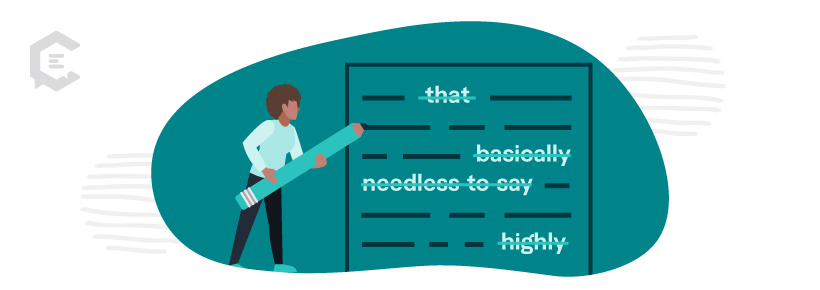
4. Eliminate filler words and unnecessary qualifiers.
Removing unnecessary words from writing is simple when you eliminate filler words.
Filler words are easy to identify in speech: “Um,” “Ah,” and “Like” are a few that are easy to pick out in an everyday conversation. But imagine a speech where the speaker’s ideas flow from one to the other, and they never fill the space with unnecessary noise.
Even the most elegant writer uses filler words and unnecessary qualifiers (at least in the first few drafts). Deleting these common fillers can refine the delivery of your writing.
- In order to
- When all is said and done
- Needless to say
- For what it’s worth
- In my humble opinion
- For all intents and purposes
5. Tighten common conversational phrases.
In an effort to make writing sound conversational, marketers sometimes pick up the excess words people use unintentionally when speaking. In written copy, we have to learn to say it in fewer words. Here are some examples and how to shorten them for the page:
- As to whether = whether
- Due to the fact that = because
- For the purpose of = to/for
- In spite of the fact that = despite/although
- In the event of = if
- In the process of = when/while
- Has the ability to = can
- With regard to = regarding
- With the possible exception of = except
6. Delete the preface.
The dreaded author’s preface is often seen in conversational writing, but marketers have to be aware of important details and trust readers to recognize those details as well. Avoid prefacing statements with “It’s interesting to note” — shouldn’t the reader, not you, get to decide if it’s interesting?
7. Kill your darlings.
Here’s an easy way to remove unnecessary words from writing: kill your darlings. Every author has written something they think is too beautiful or too worthy to delete but that they couldn’t get right. They force the lines into places they just don’t belong.
Marketers can also use this writing trick to tighten up blog posts , ebooks, email marketing, and more. Copy the content over to another document and save it for another time.

8. Highlight all your to-be verbs.
This exercise will show you, in neon ink, just how often and how heavily you depend on these boring verbs and where you need to plug in better, brighter ones. Once you’ve replaced your verbs, read over your piece again. You’ll see with just this one change, your piece is tighter and stronger.
Here’s a refresher on to-be verbs:
9. Order words for emphasis.
Put your strongest content at the beginning and end. Teachers and journalists sometimes refer to this as a 2-3-1 rule — put the second strongest images and words at the beginning, the boring bits in the middle, and the best details at the end.
A great example of this comes from Shakespeare’s Macbeth: “The Queen, my lord, is dead.” The most important part of this short sentence is dead . The second most important is the Queen, and Shakespeare just hides the title in the middle. This packs a punch at the end and leaves the reader wanting to know what’s next.
Practice this same technique within paragraphs and even for full articles. Put the best stuff at the end for emphasis, but don’t let the beginning suffer for it. A long sentence full of commas and tangents, followed by a short two- or three-word sentence, is like power-loading a spring and a great way to end an important paragraph.
10. Don’t commit thesaurus crimes.
While this won’t help you remove unnecessary words from writing, consulting a thesaurus can help you improve your content overall — as long as you don’t overdo it.
The point of a thesaurus is not to find a longer, more sophisticated word; it’s to find a better word.
11. Employ the 10% rule.
William Zinsser, author of “On Writing Well,” says: “Writing improves in direct ratio to the number of things we can keep out of it that shouldn’t be there… Examine every word you put on paper. You’ll find a surprising number that doesn’t serve any purpose.”
Zinsser proposes you can cut 50 percent of a draft to remove unnecessary words in writing and say the same thing. But if cutting 50 percent of a draft makes you want to hyperventilate, aim for 10 percent. You can almost always cut two words out of a 20-word sentence and not miss a thing. See?
Clear and concise doesn’t mean shorter. It means efficient and economical. Be intentional about your word choices, save the best for last, and whittle away 10 percent. Force your verbs to do the heavy lifting and cut the clutter. Make every word tell.
Make every word count. Talk to a content specialist at ClearVoice about developing engaging content for your brand today.
Stay in the know.
We will keep you up-to-date with all the content marketing news and resources. You will be a content expert in no time. Sign up for our free newsletter.

Business Case

How to Measure Success in Content Distribution: Essential Metrics and KPIs
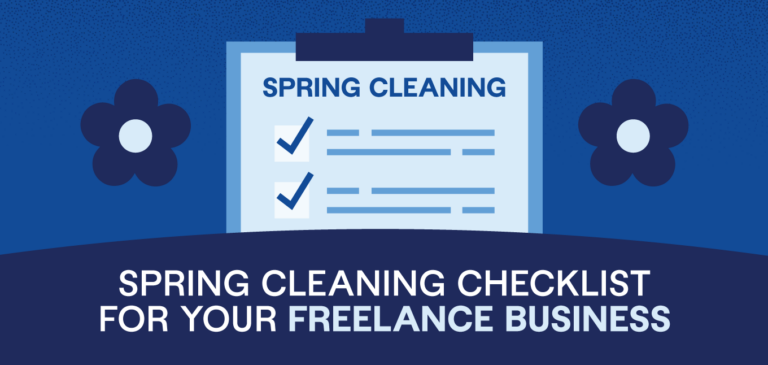
The Ultimate Spring Cleaning Checklist for Your Freelance Business
- Content Production
- Build Your SEO
- Amplify Your Content
- For Agencies
Why ClearVoice
- Talent Network
- How It Works
- Freelance For Us
- Statement on AI
- Talk to a Specialist
Get Insights In Your Inbox
- Privacy Policy
- Terms of Service
- Intellectual Property Claims
- Data Collection Preferences

Microsoft 365 Life Hacks > Writing > Recognizing & Avoiding Filler Words
Recognizing & Avoiding Filler Words
Hemming and hawing may have its place, but chances are that place isn’t in your next presentation or piece of writing. Learn how to recognize common filler words, then work to reduce your use of them.

What are Filler Words?
Any word written or said that doesn’t add to the meaning of a sentence is technically a filler word. In the previous sentence, removing the word “technically” doesn’t change the meaning of the sentence, so “technically” is, itself, technically a filler word.

Write with Confidence using Editor
Elevate your writing with real-time, intelligent assistance
Common Filler Words in Speech & Writing
Whether you’re chatting with a colleague or presenting during a meeting, you may find one or more of these filler words or phrases coming out in your speech:
- For what it’s worth
- In my (humble) opinion
- It goes without saying/needless to say
- Really/very
All these filler words can pop up in your writing, too, so be on the lookout for them there as well.
Filler Words Most Common in Speech
Filler words that are almost exclusive to oral expression include:
- You know (what I mean)
It’s not often you’ll find occasion to write “uh” or “um” unless you’re working on dialog, so you probably don’t have to worry about speech filler words showing up in your writing.
What Does it Mean When Someone Uses Filler Words?
The use of filler words can signal a few different things:
- Being diplomatic. If someone’s hemming and hawing after being asked something the answer to which may be unkind, an “uh,” “um,” or “well” might blunt the blow of all that honesty.
- Holding onto attention or the speaking role. When going silent or pausing signals that the floor open for someone else to speak, deploying filler words can help retain your turn to speak.
- Jumping into a conversation. An effective interjection doesn’t have to be a meaningful word—just pivot the audience’s focus. “Actually,” “well,” and “although” can all be used to verbally step into a conversation or presentation.
- Taking up space. Whether trying to make an assignment’s wordcount creep up or preventing someone else from talking, taking up space is a common use of filler words.
- Taking up time. Looking up the answer to a question during a meeting or in court can often come with some filler words to buy some time.
How to Avoid Filler Words in Writing
As tried and true a method for lengthening a research paper as futzing with the margins, filler words help a concise essay expand into a meandering treatise. Even middle school students know, though, that longer isn’t always better when it comes to your writing. Here are tips for trimming the fat from your next written project:
- Keep meaning in mind. Everything you put on the page should add to the meaning of the work. This can get tricky, though, because what may seem like filler might actually be meaningful—especially words or phrases that punctuate a point.
- Edit judiciously. Look for anything superfluous and cut it out. Then, review your work again. And again. Don’t be precious about your work. If you’re worried that you may cut something you need, take advantage of versioning and version control available through your word processor or cloud storage, like Microsoft OneDrive’s version history feature .
- When in doubt, leave it out. Take advantage of built-in editors, like Microsoft Editor , to gut check how concise your sentences are.
How to Avoid Filler Words in Speech
It’s been shown that while filler words don’t offer much in the way of written content, they’re often important to spoken content. i But the more formal a moment, the less appropriate filler words are. A presidential address inspires less confidence if it’s riddled with filler words. In fact, studies have shown that listeners assume that the use of filler words means the speaker is unprepared. ii But how can you set about avoiding these words in your own speech?
- Beware and be aware. Knowing is half the battle, right? Do your best to recognize which filler words you default to—and what situations cause you to break them out.
- If it’s a prepared speech, practice. Public speaking is often practiced , but you can also practice talking points for presentations that invite an exchange with the audience. The more you practice, the less likely you are to use a filler word. For every minute of presentation, do an hour of practice. iii
- Wait to speak until you know what to say. If you’re unsure what to say next—and there’s no risk of someone jumping in to interrupt you—simply pause rather than take up time or space with “uh” and “um.”
- Calm down. Whether you’re calmed by practicing, deep breathing, or choosing one person in the audience to focus on, rooting yourself in calm will help your speaking come more naturally.
Finding ways to cut down on filler is a step toward more clear, powerful speaking and writing. Just make sure you don’t trim away meaning or personality while you cut out the fluff.

Get started with Microsoft 365
It’s the Office you know, plus the tools to help you work better together, so you can get more done—anytime, anywhere.
Topics in this article
More articles like this one.

What is independent publishing?
Avoid the hassle of shopping your book around to publishing houses. Publish your book independently and understand the benefits it provides for your as an author.

What are literary tropes?
Engage your audience with literary tropes. Learn about different types of literary tropes, like metaphors and oxymorons, to elevate your writing.

What are genre tropes?
Your favorite genres are filled with unifying tropes that can define them or are meant to be subverted.

What is literary fiction?
Define literary fiction and learn what sets it apart from genre fiction.
Everything you need to achieve more in less time
Get powerful productivity and security apps with Microsoft 365

Explore Other Categories
How to stop saying “um”: 6 tips for removing filler words

If you’re not a robot, you likely don’t speak in an uninterrupted, grammatically flawless manner.
When humans talk, it's normal to subconsciously use short filler words that fill brief pauses while we think of whatever we will say next. These words also give others a verbal cue that we have more to say, even if we've stopped speaking for a moment.
Filler words are perfectly natural in everyday conversation, but there are situations where it makes sense to remove filler words from recordings.
Keep reading for the lowdown on how to stop saying um, when you should use filler words, and how to avoid the hassle of manually removing them by using Descript’s advanced AI tools.
What are filler words?
A filler word is a phrase that fills in pauses or gaps in everyday speech. In English-speaking countries, a lot of people use filler words like “um,” “uh,” “well,” “you know,” and “I mean.”
Some might call them verbal crutches, but the use of filler words serves a purpose. Not only do they keep the flow moving while your brain catches up, they also communicate tone, soften otherwise brash declarations, and even act as in-group signaling. But they’re not always the best way to get your message across.
Why remove filler words
Here are a few of the main reasons why you’d consider removing filler words from your podcast:
- Better listener engagement. If you’ve ever listened to a podcast and thought, “Can you please just get to the point already?” or found yourself waiting for the next time the host mutters “um,” you know what we’re saying here. Excessive filler words can quickly annoy listeners, so removing them might help you hold their attention.
- Increased credibility. A clear, concise message is often more persuasive. Whether you’re recording a podcast or sharing a screencast with your team, using fewer filler words is a sign of well-structured thought and confidence in the subject matter.
- Improved professionalism. Filler words fit in naturally in podcasts centered around casual conversations. But it makes sense to remove filler words from more formal podcasts like narrative audio dramas, storytelling-focused shows, and investigative news reports — or really any show with a more polished tone.
- Effective time management. One filler word may only take a millisecond or two, but that time adds up quickly when you consider all the filler words that can slip in over the course of an episode. If your episode feels slow or you’re slightly over your target length, cutting filler words can help shorten it without losing valuable content.
What’s the problem with using too many filler words?
Here's the thing: filler words are fine when you're talking to friends. However, when you're talking in a more serious setting, like recording a YouTube video or podcast, they can make you sound like you don't have a lot of confidence in what you're saying. So it’s good to be aware of them (and remove them) in situations where you want to sound clear and on point.
6 tips to avoid saying um and other filler words
1. pause and collect your thoughts.
When you feel the urge to say "um" or another filler word, take a deep breath instead. You may have briefly lost your train of thought and can't find the right words. It's ok.
With a pause, you'll be able to gather your thoughts, whether you're public speaking or recording a video, and your delivery will have a natural rhythm that listeners appreciate.
2. Replace filler words with silence
Embracing silence can be uncomfortable at first, but it's far more effective than using filler words. Silent pauses give the impression of composure and good communication skills. It also lets listeners absorb what you've said and anticipate your next point.
💡 PRO TIP: Make eye contact with your audience during a silent pause. This act commands attention, whether you’re on camera or in person, and emphasizes the importance of what you just said, or what you’re about to say. Use silence to your advantage!
3. Use transitional phrases
Transitional phrases smoothly guide you from one point to the next, so you avoid pauses filled with "um" or other fillers. They act as bridges in your speech.
You can use phrases like "Moving on to...", "Let's talk about...", or "I think another important point is...". It keeps the audience on track and prevents fillers. If you're transitioning from discussing a product's benefits to its features in a video, you might say, "Having explored its benefits, let's look at its unique features..."
4. Record and analyze yourself
It can be eye-opening to record yourself speaking and then analyze the recording. You'll be able to hear where you insert fillers and how to fix them.
If you find yourself uttering "ums" frequently, you can practice pausing and thinking silently before speaking. That way, you can consciously replace filler words with pauses or meaningful content when you're aware of it.
5. Practice with bullet points or prompts
When you're trying to remember what to say next, bullet points, cue cards, or other prompts can help keep your mind organized.
If you’re demonstrating a product, keep your outline visible with key points. For example, you might have bullet points like “Discuss battery life, then move on to camera quality.” You’ll stay more on track without resorting to fillers. If you have a little extra budget, you can buy teleprompter software to read off your script when recording video or audio.
6. Focus on key messages
Know the most important points you want to convey before hitting record. Ask yourself, “What do I want my audience to learn or remember from this?” For a tutorial video, this could be the main steps of a process you’re teaching.
With key messages as your guide, it becomes easier to stay on topic and resist the temptation to go off on tangents that might lead to filler words.
What to consider when removing filler words
Even with all the practice in the world, filler words still slip in sometimes. At that point, you’ll need to remove them in the editing stage. But before you go on a filler-word removing frenzy, here are a few things to think about.
- Removing too many filler words can sound unnatural. It’s fine to remove a few "ums" here and there, but avoid going overboard. Editing out every single filler word tends to make a speaker sound robotic and inauthentic.
- Filler words belong in certain formats. If you remove filler words from conversational shows, you risk making the show feel too formal and less engaging. And think twice if you’re making a comedy podcast — removing filler words risks ruining the comedic timing of certain jokes. But if you’re delivering a formal presentation, you probably don't want filler words; same goes for voiceover .
- Ask yourself if it’s worth your time. Even with Descript’s easy filler word removal tool, removing filler words adds time to the editing process. You still have to choose which filler words to remove and listen to the audio afterward to ensure it sounds correct. So avoid removing filler words just for the sake of it and make sure your podcast or episode calls for it.
How to remove filler words from audio and video using Descript
Descript’s convenient filler word removal feature instantly detects superfluous filler words and removes them from your audio track. Here’s how to get rid of filler words with just a few clicks:
Step 1. Import and transcribe your audio file
Create a new project and either drag and drop your audio file into Descript or click the “Choose a file…” button to import it. Descript will then begin to automatically transcribe your file. The transcription of a 60-minute podcast typically takes around two to three minutes.
Step 2. Look over the detected filler words
Once Descript completes your podcast transcription, it instantly labels filler words within the transcribed text using a light-blue underline. By default, Descript detects the following filler words and phrases:
- “but you know”
- “I suppose”
- “or something”
- “you know what I mean”
Step 3a. Delete filler words manually using the transcript
There are a couple different options for removing detected filler words. To remove words one-by-one in your transcription, just highlight a filler word with your cursor and hit the “delete” key.
Descript then deletes that word from your audio track and automatically crossfades the newly conjoined regions, creating a pretty seamless edit.
You can identify these filler words yourself, or run Descript's Filler word detection , which will underline each filler word in light blue.
Step 3b. Delete filler words automatically using the “Remove Filler Words” tool
Your second option is to have Descript remove your filler words automatically. Click the Action icon at the top of your transcription and select “Remove filler words…”
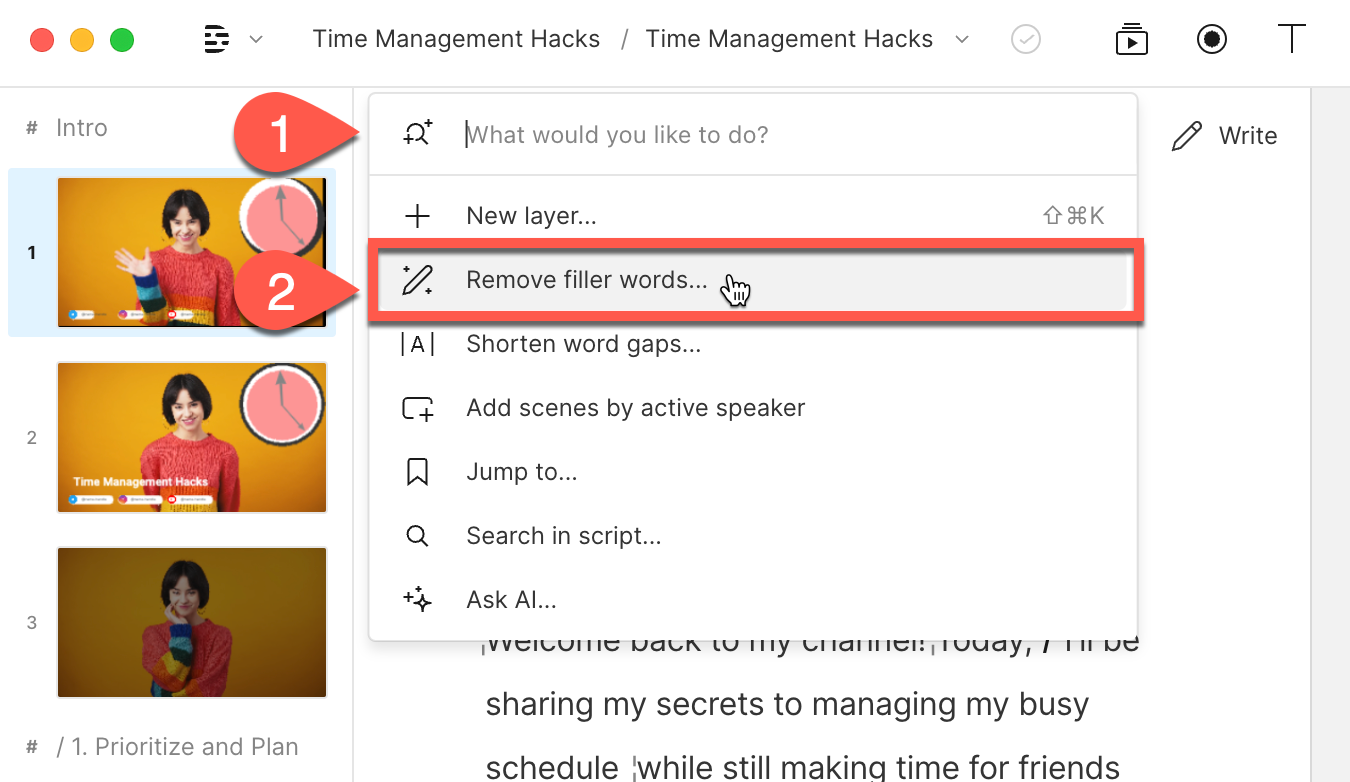
This brings up a dropdown menu displaying every filler word the app detected, and giving you four removal options:
- Delete: Removes the filler word from both the audio track and the transcription.
- Delete and replace with gap: Adds a gap in the audio equal to the length of the spoken word.
- Ignore: Removes the word from the audio track, but only crosses out the word in the transcription, so you have a visual record of its being there.
- Remove from transcript: Removes the filler word or phrase only from the transcript.
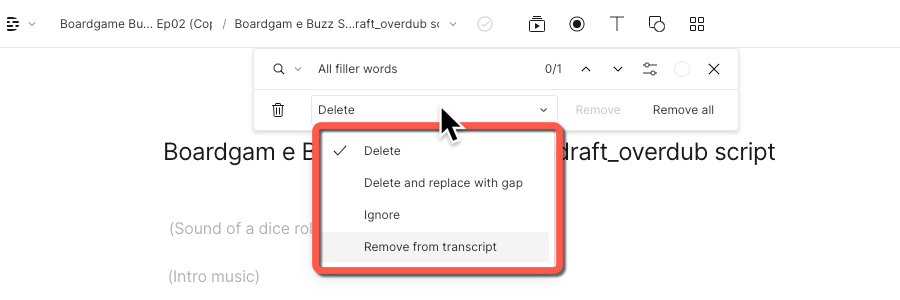
Choose your removal option, and Descript will handle the rest. Your script will be free from crutch words and filler phrases in seconds.
💡 PRO TIP: Need to restore a removed filler word? Go to “Edit” > “Undo” or press Command + Z (MacOS) or Control + Z (Windows). If you use the “Ignore” function, you can also restore the word at any point by highlighting it within the transcript and clicking the “Strikethrough” button in the top toolbar.
Talking without filler words is one of the hardest speaking skills to learn. But you don’t have to hire a speaking coach to become a good speaker.
With Descript, you can talk into the mic as you normally would, and quickly remove filler words when editing, making your content more clear and impactful. Create a free account today to start.
Featured articles:

AI for Creators
9 AI content creation tools to supercharge your creativity
AI content creation is exploding, but some tools are better than others. Find the best in this guide.

How to write a YouTube script that engages your audience: The ultimate guide
Are you looking to create better narratives in your YouTube videos? Learn how to write a YouTube script that keeps people hooked.

Other stuff
10 excellent Loom alternatives to record your screen
Looking for the best ways to record your screen without Loom? Find out 10 Loom alternatives, their features, and pricing.
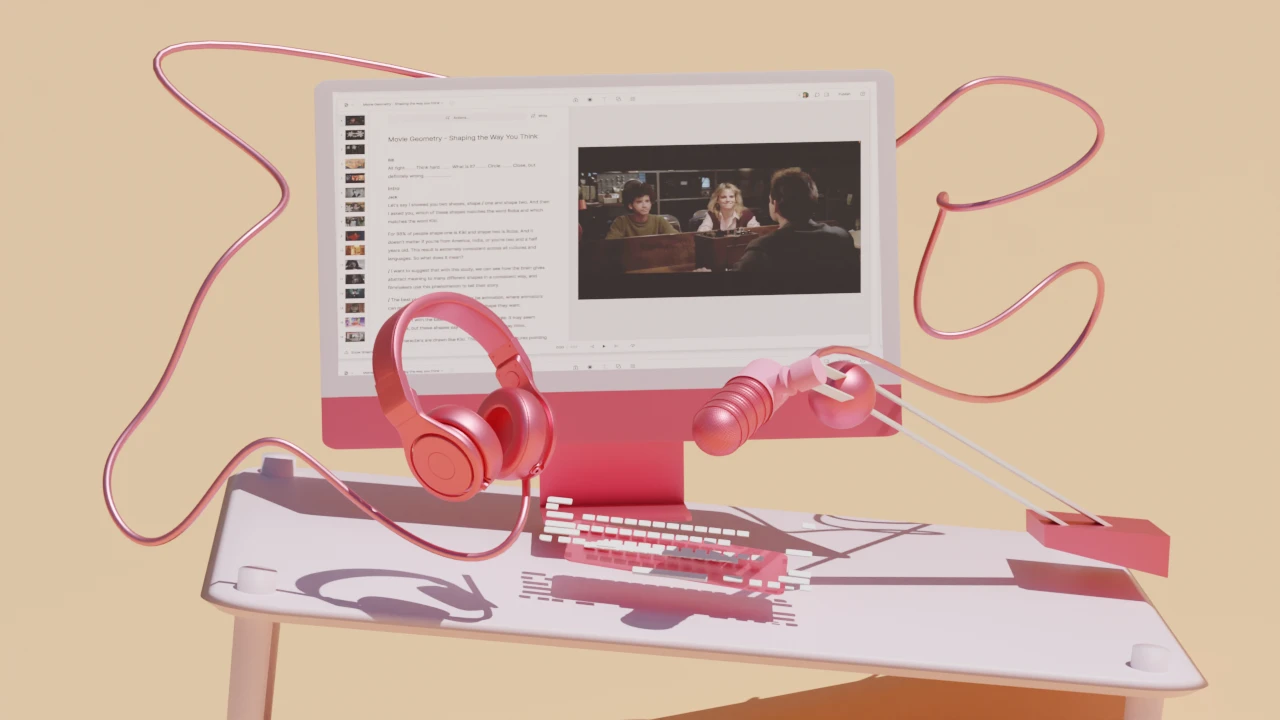
How to use Descript: Tips & tricks to speed up your editing workflow
Descript makes audio & video editing easier, but even experts may not know how to use Descript to its full potential. Here are 7 tips to help.

The ultimate guide on how to get more views on TikTok
Learn how to get more views on TikTok and create engaging content with these 11 tips.

How to edit short form video to attract the most views
Short-form video follows its own rules. Learn best practices for short-form platforms, plus tips for making the most engaging videos.

Articles you might find interesting

3 tips to get the most out of your podcast's sound designer
Knowing how to communicate with your sound designer is extremely important, and not just because their time is your money. Here's how to make sure both of you bring your A-game to the project.

Tips & Tricks
How to get your old podcast episodes on YouTube — no video required
Your podcast should be on YouTube, but that's a challenge if your old episodes don't have video. Here's how you can make it happen.

How to record a YouTube video: A guide for all devices
If you want to record a YouTube video for personal use or fair-use repurposing, here are the steps to get started.

Product Updates
New: Project sidebar, edit-boundary review, comment tagging
A new version of Descript features an improved Project Sidebar, edit boundary review tool, and comment tagging.

How to add intro music to YouTube videos
Just like everything else on YouTube, there’s no single, one-size-fits-all formula for the intro music. Learn all about some of the best practices for your Youtube intros.

Video resolution 101: What it is and how it impacts video quality
Our comprehensive guide to video resolution. Learn how it impacts your video quality, the types you need to know, and why it matters when it’s time to create stunning videos.
.jpg)
Join millions of creators who already have a head start.
Get free recording and editing tips, and resources delivered to your inbox.
Related articles:
Share this article
5 Ways to Remove Background Color From Text in Word
Applying a background color to text is a neat way to highlight important information in your Word documents. But, it does disturb the cleaner look of a document. Whether the highlight was inherited from copied text or accidentally applied while working on the document, you can easily remove it. This guide covers several methods to remove the background color from text in Microsoft Word for Mac or Windows.
Table of Contents
1. Use the Text Highlighter Tool
Using the text highlighter tool in Microsoft Word is the easiest way to add or remove background color from your text. Here’s how to unhighlight text in your Word document.
1. Open your Word document and select the text from which you want to remove highlights. To select all text, press Control + A keyboard shortcut.
2. Select the Home tab at the top. Then, click the tiny arrow next to the Text Highlight Color icon and choose No Color from the resulting menu.
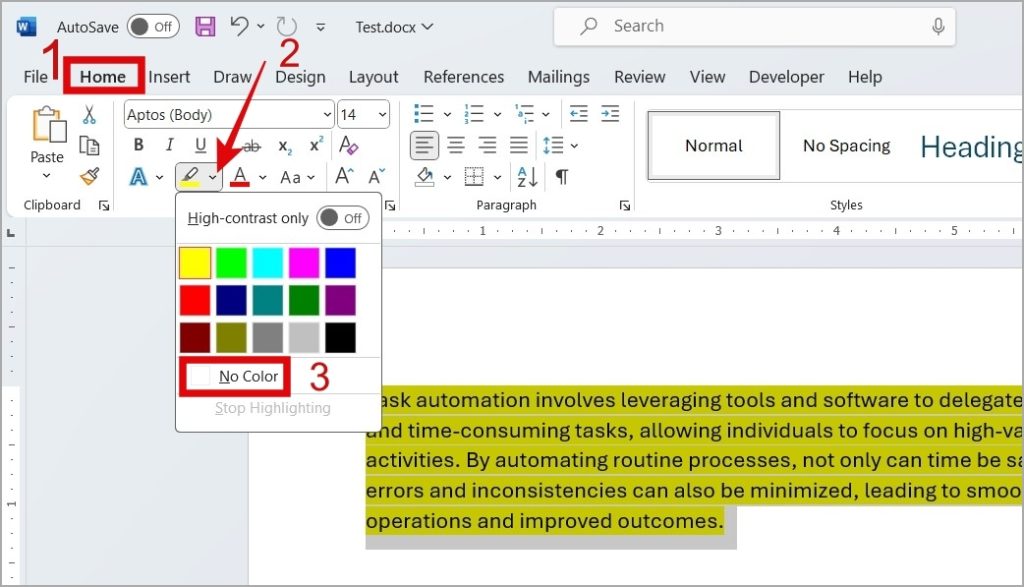
2. Remove the Shading Color
If you can’t remove background color from your text using the highlighter tool, your paragraph or section likely has some form of shading applied to it rather than text highlight. In that case, you can use these steps to remove shading from text in your Word document.
1. Open your Word document. Select the text from which you want to remove the shading.
2. Select the Home tab at the top. In the Paragraph section, click the tiny arrow next to the Shading icon and select No Color from the menu that appears.
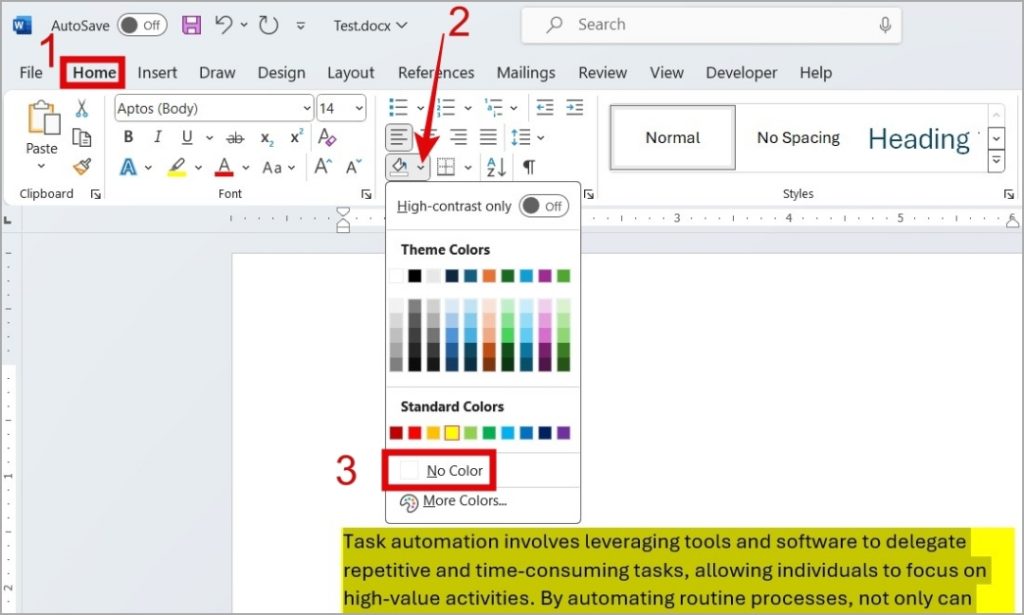
3. Use the Control + Space Keyboard Shortcut
Using the Ctrl + Space keyboard shortcut in Microsoft Word is the quickest way to remove all formatting from your text, including text highlights. Note that this method is not useful if you wish to retain the font style , color, effect, and other formatting characteristics.
Open your Word document and select the text with the background color. Then, press the Control + Space keyboard shortcut to remove the highlight. Alternatively, you can head over to the Home tab and click on the Font icon to get the Clear All Formatting button.
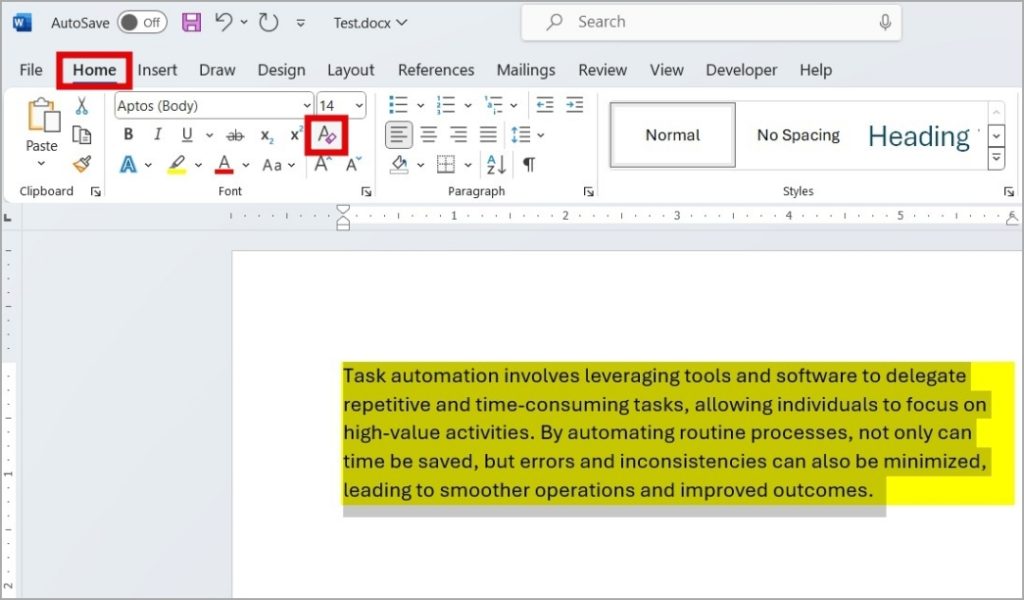
4. Paste as Unformatted Text
When you copy text into a Word document, it can carry over formatting, including background color. To prevent this from happening, you can paste your text unformatted. This way, you won’t need to manually remove the gray background color from the copied text in your Word document. Here’s how to do it.
1. Open your Word document and select the text from which you want to remove the background color. Then, press Control + X keyboard shortcut to cut the text.
2. Head to the Home tab, click the arrow under the Paste button and choose Paste Special .
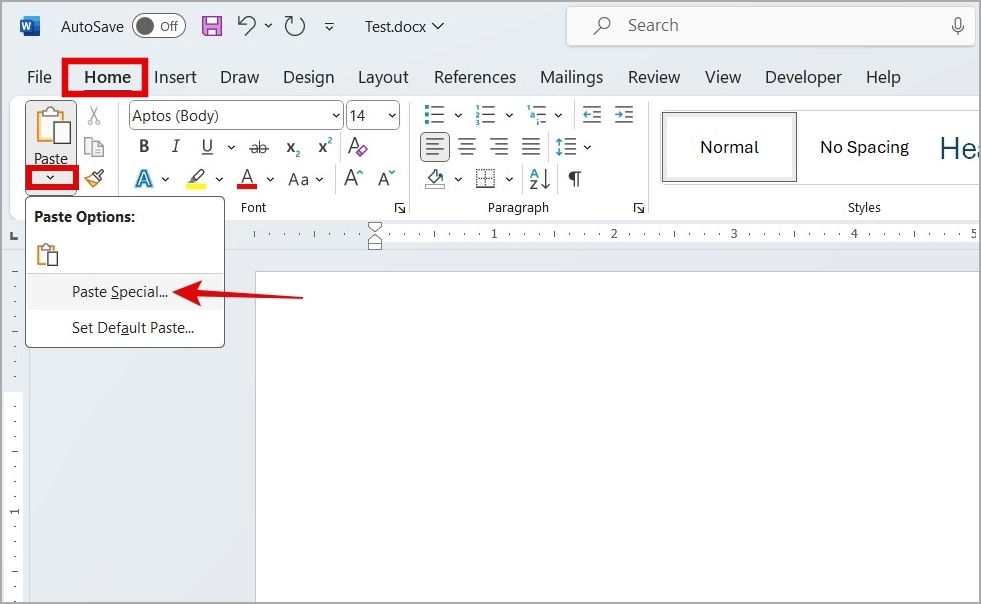
3. Select Unformatted Text and hit OK .
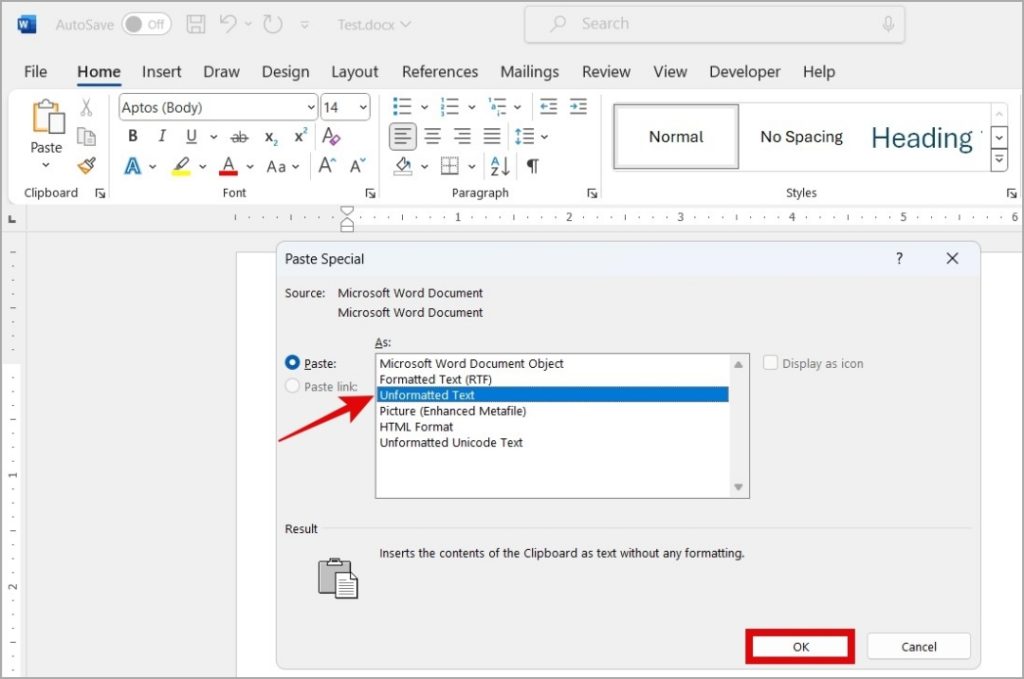
Tip: In Word, you can use Control + Shift + V keyboard shortcut instead of Control + V to paste text without formatting.
5. Use the Find and Replace Tool
While the above methods are straightforward for removing background color from only a few sentences or paragraphs, they may not be efficient for long Word documents . In such cases, you can use the Find and Replace tool in Word to remove background color from text. Here’s how:
1. Open your Word document and press Control + H keyboard shortcut to access the Find and Replace tool. In the Replace tab, click the More button.
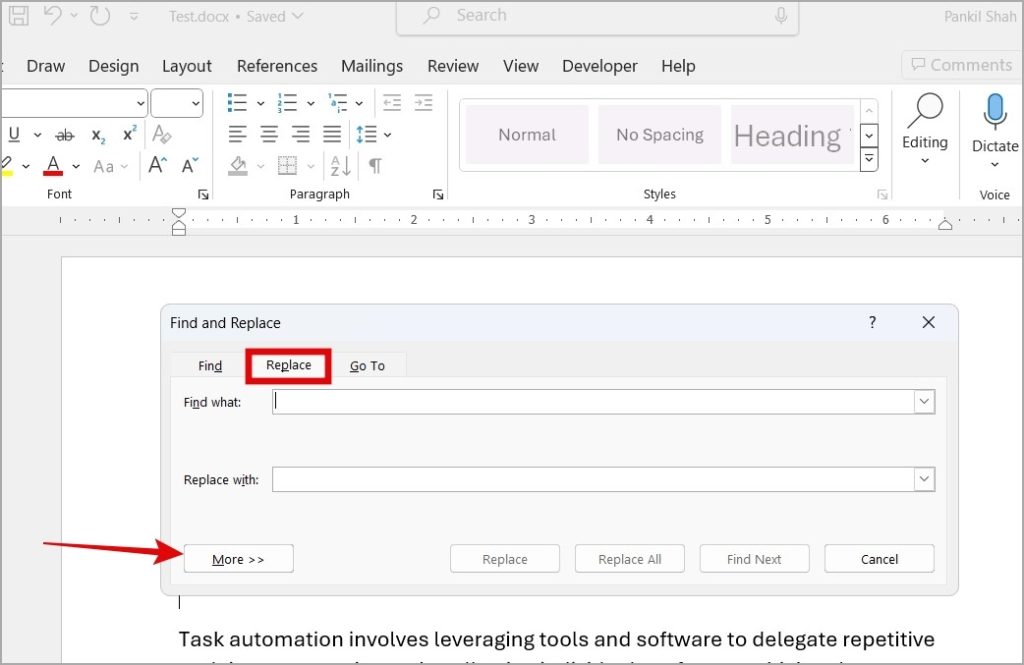
2. Click the Find what field and leave it blank. Then, click the Format button at the bottom left corner and choose Highlight .
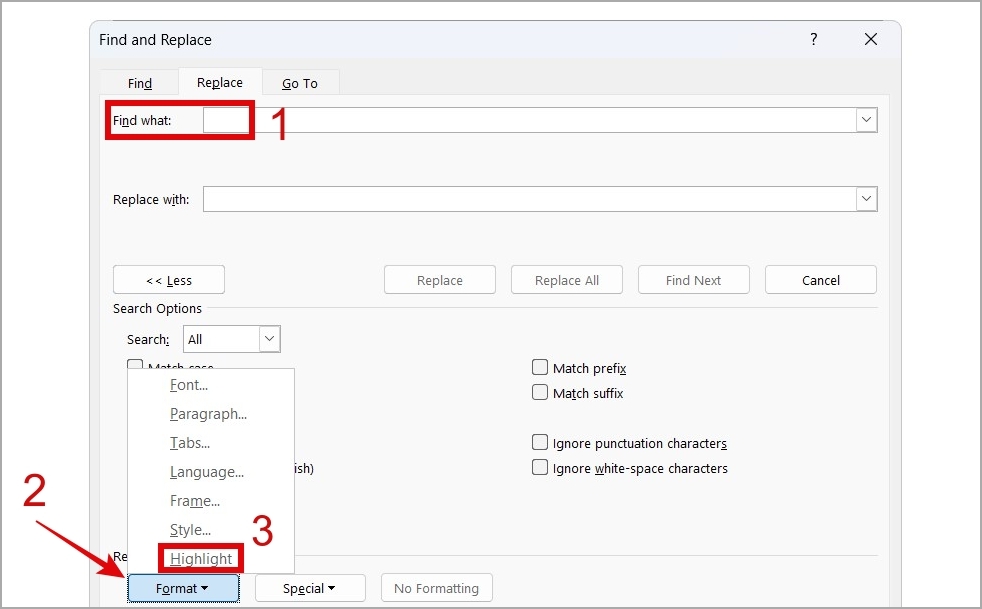
3. Click the Replace with field and leave it blank. Then, click the Format button at the bottom and select Highlight .
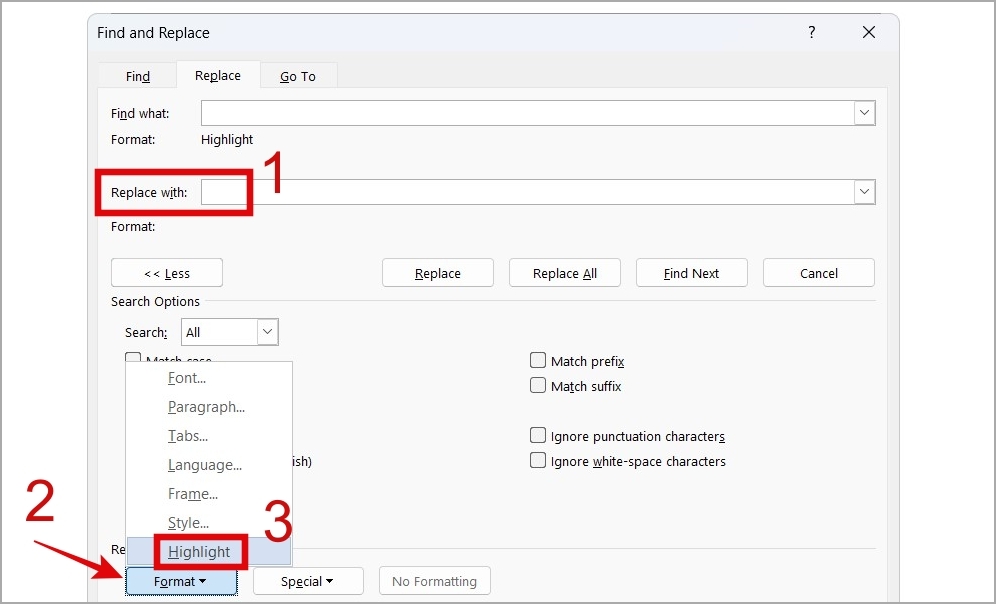
4. Click the Format button one more time and select Highlight .
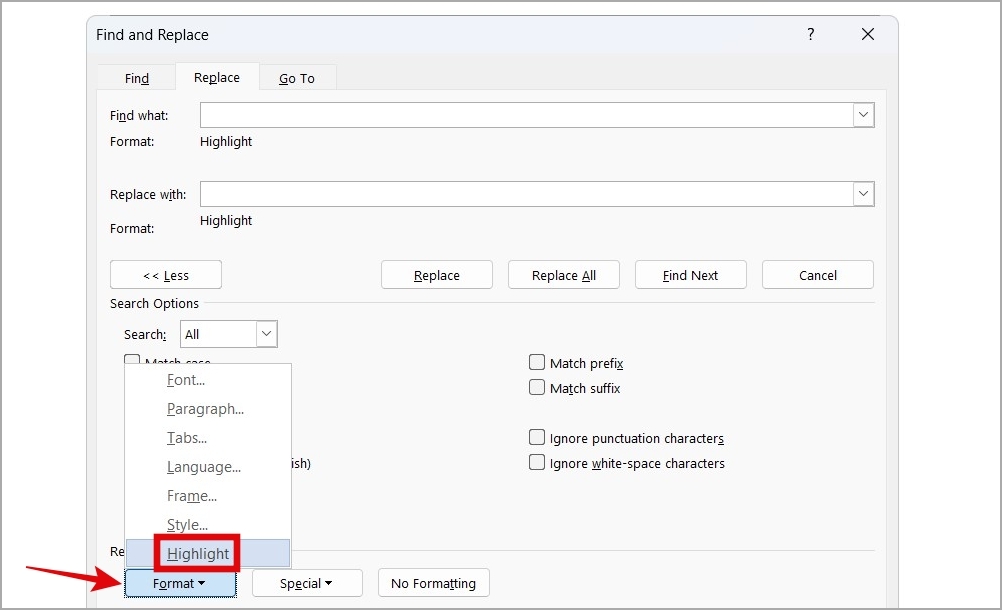
5. Finally, click the Replace All button and then click OK to continue.
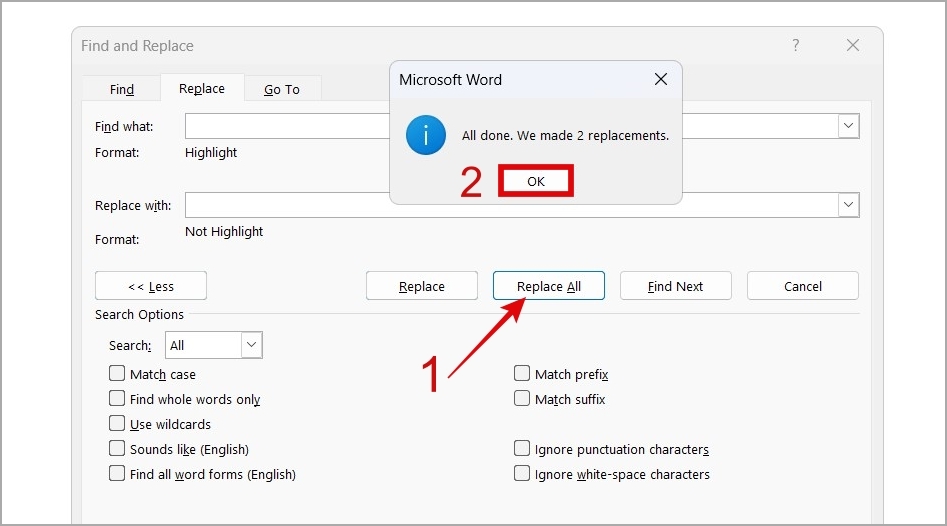
Microsoft Word will remove highlights from all the text in your document.
Simplify to Amplify
Highlighting text may be effective for emphasizing a point. But if an entire paragraph or page full of text is highlighted, it looks like an eyesore. If you goof up while trying to remove highlights, don’t sweat it. Just hit the Control + Z keyboard shortcut to undo the unintended removal.

Pankil Shah
Pankil is a Civil Engineer by profession who started his journey as a writer back in 2016. He joined TechWiser in March 2021 as a freelance writer to cover buying guides, explainers, and tips & tricks for Android, iOS, Windows, and Web.
You may also like
How i look up ip address of any..., 5 fixes for tiktok’s page not available error, how to sign out of amazon on all..., how do i log out of my instagram..., why can’t i unsend a message on facebook..., how to stop certain ads on youtube, what happens when you deactivate tiktok account, 7 fixes for netflix picture-in-picture not working on..., how to create and share an outlook calendar, 9 fixes for tiktok not working on wi-fi.
- Share full article
Advertisement
Supported by
Guest Essay
There’s No Such Thing as an American Bible

By Esau McCaulley
Contributing Opinion Writer
The presumptive Republican nominee for president of the United States, who weeks ago started selling shoes , is now peddling Bibles. During Holy Week.
What’s special about this Bible? So many things. For example, according to a promotional website, it’s the only Bible endorsed by Donald Trump. It’s also the only one endorsed by the country singer Lee Greenwood. Admittedly, the translation isn’t distinctive — it’s your standard King James Version — but the features are unique. This Bible includes the Constitution, the Bill of Rights, the Declaration of Independence, the Pledge of Allegiance and part of the lyrics of Mr. Greenwood’s song “God Bless the USA.” Perhaps most striking, the cover of the Bible does not include a cross or any symbol of the Christian tradition; instead, it is emblazoned with the American flag.
While part of me wants to laugh at the absurdity of it — and marvel at the sheer audacity — I find the messaging unsettling and deeply wrong. This God Bless the USA Bible, as it’s officially named, focuses on God’s blessing of one particular people. That is both its danger and, no doubt for some, its appeal.
Whether this Bible is an example of Christian nationalism I will leave to others. It is at least an example of Christian syncretism, a linking of certain myths about American exceptionalism and the Christian faith. This is the American church’s consistent folly: thinking that we are the protagonists in a story that began long before us and whose main character is in fact the Almighty.
Holy Week is the most sacred portion of the Christian calendar, a time when the church recounts the central events of our faith’s narrative, climaxing in the death and resurrection of Jesus. That story, unlike the parochial God Bless the USA Bible, does not belong to any culture.
Holy Week is celebrated on every continent and in too many languages to number. Some of the immigrants Mr. Trump declared were “ poisoning the blood” of America will probably shout “Christ is risen!” this Easter. Many of them come from the largely Christian regions of Latin America and the Caribbean. They may have entered the country with Bibles in their native tongues nestled securely among their other belongings.
One of the beauties of the Christian faith is that it leaps over the lines dividing countries, leading the faithful to call fellow believers from very different cultures brothers and sisters. Most of the members of this international community consist of the poor living in Africa, Asia and Latin America. There are more Spanish-speaking Christians than English- speaking ones .
If there are central messages that emerge from the variety of services that take place during Holy Week, for many Christians they are the setting aside of power to serve, the supremacy of love, the offer of divine forgiveness and the vulnerability of a crucified God.
This is not the stuff of moneymaking schemes or American presidential campaigns.
It was Pontius Pilate , standing in as the representative of the Roman Empire, who sentenced Jesus to death. The Easter story reminds believers that empires are more than willing to sacrifice the innocent if it allows rulers to stay in power. The church sees Christ’s resurrection as liberating the believer from the power of sin. The story challenges imperial modes of thinking, supplanting the endless pursuit of power with the primacy of love and service.
Easter, using the language of St. Augustine, represents the victory of the City of God over the City of Man. It declares the limits of the moral reasoning of nation-states and has fortified Christians who’ve resisted evil regimes such as fascists in South America, Nazis in Germany, apartheid in South Africa and segregation in the United States.
For any politician to suppose that a nation’s founding documents and a country music song can stand side by side with biblical texts fails at a theological and a moral level. I can’t imagine people in other countries going for anything like it. It is hard to picture a modern “God Bless England” Bible with elements of British common law appended to Christianity’s most sacred texts.
I am glad for the freedoms that we share as Americans. But the idea of a Bible explicitly made for one nation displays a misunderstanding of the story the Bible attempts to tell. The Christian narrative culminates in the creation of the Kingdom (and family) of God, a transnational community united by faith and mutual love.
Roman Catholics , Anglicans and Orthodox Christians, who together claim around 1.5 billion members, describe the Bible as a final authority in matters of faith. Evangelicals, who have overwhelmingly supported Mr. Trump over the course of three election cycles, are known for their focus on Scripture, too. None of these traditions cite or refer to any American political documents in their doctrinal statements — and for good reason.
This Bible may be unique in its form, but the agenda it pursues has recurred throughout history. Christianity is often either co-opted or suppressed; it is rarely given the space to be itself. African American Christians have long struggled to disentangle biblical texts from their misuse in the United States. There is a reason that the abolitionist Frederick Douglass said that between the Christianity of this land (America) and the Christianity of Christ, he recognized the “widest possible difference.”
And while Christianity was used to give theological cover to North American race-based chattel slavery, it was violently attacked in places like El Salvador and Uganda, when leaders including the archbishops Oscar Romero and Janani Luwum spoke out against political corruption.
The work of the church is to remain constantly vigilant to maintain its independence and the credibility of its witness. In the case of this particular Bible, discerning what is happening is not difficult. Christians are being played. Rather than being an appropriate time to debut a patriotic Bible, Easter season is an opportune moment for the church to recover the testimony of the supremacy of the cross over any flag, especially one on the cover of a Bible.
Esau McCaulley ( @esaumccaulley ) is a contributing Opinion writer, the author of “ How Far to the Promised Land: One Black Family’s Story of Hope and Survival in the American South ” and an associate professor of New Testament at Wheaton College.
The Times is committed to publishing a diversity of letters to the editor. We’d like to hear what you think about this or any of our articles. Here are some tips . And here’s our email: [email protected] .
Follow The New York Times Opinion section on Facebook , Instagram , TikTok , WhatsApp , X and Threads .

IMAGES
VIDEO
COMMENTS
Kind of/Sort of. "Kind of" and "sort of" make it sound like the item you are discussing is not actually certain. Leaving off these words makes the writing stronger. For example: Filler: The dinner sort of smelled like tacos. Better: The dinner smelled like tacos. 33. And Etc. Using "and" with "Etc." is redundant.
As a matter of fact - Empty Phrase. Don't use it. Ex: As a matter of fact, I did eat all the candy. Better: Yes, I ate the candy. As being - Filler expression. You don't need being. Ex: She is known as being the smartest in the school. Better: She is known as the smartest in the school. Ascend up - Redundant phrase.
Filler words weigh down a sentence and can add up to throw off the entire paragraph structure. Like editing a draft, removing the unnecessary filler words strengthens your remaining words, helping you communicate both clearly and succinctly. Filler words in writing. Filler words also exist in writing, although for different purposes.
Filler words are empty phrases that don't add anything substantial to what you're writing. They can muddle your points and weigh down your paragraphs. The more direct and concise you can be, the better your pieces will read. If communicating concisely and clearly is your goal, eliminating filler words is an easy way to shave content you don ...
We should perform a local test before applying the new method to our system. [14 words] As shown in the examples above, eliminating filler words can significantly reduce your word count! On average, we've cut the word count of the sentences above by 25-30%. Look at your most recent writing. Now imagine it 25-30% leaner by eliminating fillers ...
Filler words in creative writing include the overuse of adverbs and adjectives. Using these words also makes you 'tell' rather than 'show'. If you write well, using strong verbs and precise nouns, you will show. Weak verbs make you tell. [Read 5 Incredibly Simple Ways to Help Writers Show and Not Tell and 3 Simple Ways To Show And Not Tell]
Filler words are additions to our sentences that, rather than adding substance, dilute the clarity and impact of writing. They cling to words like little linguistic parasites, muddying the waters ...
What 🤷 is the difference between crutch words, empty phrases, and fillers in English Learn more about filler words in writing & speech from this article! Free Essay Database Free Essays; Writing Tools Tools. ... You can check out a wide variety of free college essay samples in our database to see how a well-written paper without any fillers ...
Er. This is a filler word that is similar to "um," "uh," and "ah.". However, it indicates a more negative concern regarding something. People use "er" in a sentence to show doubt or a potentially even alarm concerning an action, statement, or thought. You can also use this word when unsure of the best course of action or ...
These words are also called filler words. These words can detract from the impact of your writing. ... composing a persuasive essay, or even just posting on social media — your words should be ...
Eliminating filler words, or phrases that don't actually add anything to the piece of writing, is the number one way to do that. ... Even if all you do is remove the word and make the second word the beginning of your sentence, it will do more to engage your reader and draw them in to what you're sharing. ... From Memory to Essay: Enhancing ...
Becoming a better writer is an art form. It requires patience, research, reading voraciously, and above all—practice. In the process, a writer's lexicon should be consistently curated, since words are the basis of the writing profession, and words that are vague or superfluous should be replaced with better ones or deleted. If you want to sharpen your craft, here are 30 words and phrases to ...
Use your best judgment. Note #3: Writing is not an exact science, and neither is editing. Rules are not hard and fast, and there is a lot of gray area. If you love one of the words on this list, don't feel like you absolutely must remove all traces of it from your work. These words only become a problem when you're relying on them all the time.
When writing the story, it's best to just get the words out so you don't feel bogged down with editing and don't hit writers block, but when it is time to polish your manuscript, there are ...
Using filler words must justify the potential fluff factor with an unexpected twist or clever turn, or they shouldn't be used at all. We want our readers to keep turning pages and to do this we need to remove blockages they may encounter. Too many words, when a simple description will suffice, makes readers skim.
Steps to Avoid Filler Words in Your Writing. Write your essay by breaking it down into smaller pieces to get it done. Common filler words that people habitually use even in speech are "well," "you know," "so," "like," and "for example.". Don't begin sentences with words like "since" or "as.". Use paradoxes that are ...
Over 100,000 people use our grammar checker daily. Popular Infographics. Show Don't Tell: 21 Emotions to Paint in Words (Infographic)
4. Eliminate filler words and unnecessary qualifiers. Removing unnecessary words from writing is simple when you eliminate filler words. Filler words are easy to identify in speech: "Um," "Ah," and "Like" are a few that are easy to pick out in an everyday conversation. But imagine a speech where the speaker's ideas flow from one ...
Filler words take up space and make sentences wordy. How to Avoid Filler Words. Here are four ways to avoid using filler words to improve your writing. 1. Start with a Brain Dump. Before you worry too much about filler words, start by freewriting until everything in your head is on the page. Write, then edit. (You can't edit a blank page!)
Looking up the answer to a question during a meeting or in court can often come with some filler words to buy some time. How to Avoid Filler Words in Writing. As tried and true a method for lengthening a research paper as futzing with the margins, filler words help a concise essay expand into a meandering treatise. Even middle school students ...
With that in mind, let's get to the list: 1. In order to. This is one of the flabbiest phrases I see in writing. People use it, but not one sentence stops working if "in order to" is deleted (or replaced with "to," which has the same meaning). This one small change makes the statement clearer. 2. Really.
This brings up a dropdown menu displaying every filler word the app detected, and giving you four removal options: Delete: Removes the filler word from both the audio track and the transcription. Delete and replace with gap: Adds a gap in the audio equal to the length of the spoken word. Ignore: Removes the word from the audio track, but only crosses out the word in the transcription, so you ...
Filler word and phrases (um, ah, uh, you know, like) Linking words between sentences (so, and, and so) Run-on sentences; Exercise 2: Ball Toss. ... Find a partner, ideally someone who also wants to increase their pauses and/or remove filler words from their communication style. One person will serve as a speaker and the other as an observer.
1. Open your Word document and select the text from which you want to remove highlights. To select all text, press Control + A keyboard shortcut. 2. Select the Home tab at the top. Then, click the tiny arrow next to the Text Highlight Color icon and choose No Color from the resulting menu. 2.
And here's our email: [email protected]. Follow The New York Times Opinion section on Facebook, Instagram, TikTok, WhatsApp, X and Threads. 554. 554. Trump's God Bless the USA Bible focuses ...
The foveal load effect is one of the most fundamental effects in reading psychology, and also one of the most controversial issues in recent years. The foveal load effect refers to the phenomenon that the difficulty of foveal processing affects parafoveal preview. In Chinese reading, whether the foveal load effect exists, as well as whether this effect is modulated by parafoveal word frequency ...